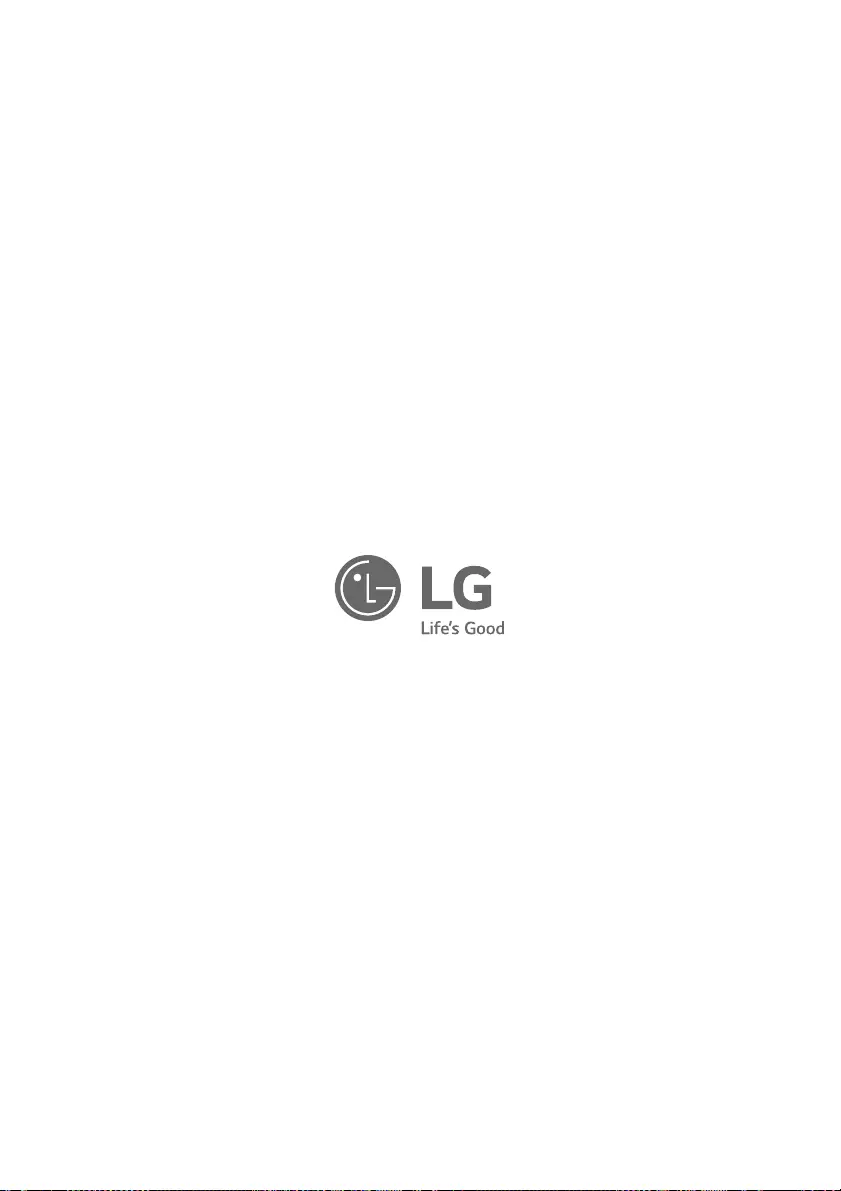Table of Contents
- SAFETY INSTRUCTIONS
- INSTALLATION
- OPERATION
- SMART FUNCTIONS
- MAINTENANCE
- TROUBLESHOOTING
LG GSXV91MCAE User Manual
Displayed below is the user manual for GSXV91MCAE by LG which is a product in the Side-By-Side Fridge-Freezers category. This manual has pages.
Related Manuals

OWNER'S MANUAL
FRIDGE & FREEZER
Before beginning installation, read these instructions
carefully. This will simplify installation and ensure that the
product is installed correctly and safely. Leave these
instructions near the product after installation for future
reference.
ENGLISH
MFL71798701
Rev.00_061021
www.lg.com
Copyright © 2021 LG Electronics Inc. All Rights Reserved.

TABLE OF CONTENTS
This manual may contain images or
content that may be different from the
model you purchased.
This manual is subject to revision by the
manufacturer.
SAFETY INSTRUCTIONS
READ ALL INSTRUCTIONS BEFORE USE...........................................................4
WARNING............................................................................................................4
CAUTION ...........................................................................................................10
CARING FOR THE ENVIRONMENT..................................................................12
INSTALLATION
Before Installation ...........................................................................................13
Removing the Fridge and Freezer Door........................................................14
Connecting the Water Line .............................................................................16
Levelling and Door Alignment........................................................................17
Turning on the Power......................................................................................19
Moving the Appliance for Relocation ............................................................19
OPERATION
Before Use ........................................................................................................20
Product Features..............................................................................................23
Control Panel ....................................................................................................27
Ice and Water Dispenser.................................................................................30
Automatic Icemaker ........................................................................................32
InstaView...........................................................................................................34
Door in Door.....................................................................................................35
Drawer...............................................................................................................35
Shelf ...................................................................................................................36
Door Basket ......................................................................................................37
SMART FUNCTIONS
LG ThinQ Application.......................................................................................38
Smart Diagnosis ...............................................................................................39
MAINTENANCE
Cleaning ............................................................................................................41
Water Filter .......................................................................................................42

4
SAFETY INSTRUCTIONS
SAFETY INSTRUCTIONS
READ ALL INSTRUCTIONS BEFORE USE
The following safety guidelines are intended to prevent unforeseen
risks or damage from unsafe or incorrect operation of the appliance.
The guidelines are separated into
‘WARNING’
and
‘CAUTION’
as
described below.
Safety Messages
WARNING
WARNING
To reduce the risk of explosion, fire, death, electric shock, injury or
scalding to persons when using this product, follow basic precautions,
including the following:
Technical Safety
• This appliance can be used by children aged from 8 years and above
and persons with reduced physical, sensory or mental capabilities or
lack of experience and knowledge if they have been given supervision
or instruction concerning use of the appliance in a safe way and
understand the hazards involved. Children shall not play with the
This symbol is displayed to indicate matters and operations
that can cause risk. Read the part with this symbol carefully
and follow the instructions in order to avoid risk.
WARNING
This indicates that the failure to follow the instructions can
cause serious injury or death.
CAUTION
This indicates that the failure to follow the instructions can
cause the minor injury or damage to the product.

5
SAFETY INSTRUCTIONS
ENGLISH
appliance. Cleaning and user maintenance shall not be made by
children without supervision.
• This appliance is not intended for use by persons (including children)
with reduced physical, sensory or mental capabilities, or lack of
experience and knowledge, unless they have been given supervision
or instruction concerning use of the appliance by a person
responsible for their safety. Children should be supervised to ensure
that they do not play with the appliance.
• Children aged from 3 to 8 years are allowed to load and unload
refrigerating appliances.
• This appliance is intended to be used in household and similar
applications such as:
- staff kitchen areas in shops, offices and other working
environments;
- farm houses and by clients in hotels, motels and other residential
type environments;
- bed and breakfast type environments;
- catering and similar non-retail applications.
• This refrigerating appliance is not intended to be used as a built-in
appliance.
•
• This appliance contains a small amount of isobutane refrigerant
(R600a), but it is also combustible. When transporting and installing
the appliance, care should be taken to ensure that no parts of the
refrigerating circuit are damaged.
• The refrigerant and insulation blowing gas used in the appliance
require special disposal procedures. Consult with service agent or a
similarly qualified person before disposing of them.
• Do not damage the refrigerant circuit.
• If the power cord is damaged or the hole of the outlet socket is loose,
do not use the power cord and contact an authorized service centre.
This symbol alerts you to flammable materials that can
ignite and cause a fire if you do not take care.

6
SAFETY INSTRUCTIONS
• Do not locate multiple portable outlet sockets or portable power
supplies at the rear of the appliance.
• Securely plug the power plug in the outlet socket after completely
removing any moisture and dust.
• Never unplug the appliance by pulling on the power cable. Always
grip the power plug firmly and pull straight out from the outlet
socket.
• Keep ventilation openings, in the appliance enclosure or in the built-
in structure, clear of obstruction.
• Do not store explosive substances such as aerosol cans with a
flammable propellant in this appliance.
• Do not tilt the appliance to pull or push it when transporting.
• When positioning the appliance, ensure the supply cord is not
trapped or damaged.
• Do not use mechanical devices or other means to accelerate the
defrosting process.
• Do not use a hair drier to dry the inside of the appliance or place a
candle inside to remove the odours.
• Do not use electrical appliances inside the refrigerator.
• Make sure not to get a body part such as a hand or foot stuck while
moving the appliance.
• Disconnect the power cord before cleaning the appliance interior or
exterior.
• Do not spray water or inflammable substances (toothpaste, alcohol,
thinner, benzene, flammable liquid, abrasive, etc.) over the interior or
exterior of the appliance to clean it.
• Do not clean the appliance with brushes, cloths or sponges with
rough surfaces or which are made of metallic material.
• Only qualified service personnel from LG Electronics service centre
should disassemble, repair, or modify the appliance. Contact an LG
Electronics customer information centre if you move and install the
appliance in a different location.

7
SAFETY INSTRUCTIONS
ENGLISH
Risk of Fire and Flammable Materials
• If a leak is detected, avoid any naked flames or potential sources of
ignition and air the room in which the appliance is standing for
several minutes. In order to avoid the creation of a flammable gas air
mixture if a leak in the refrigerating circuit occurs, the size of the
room in which the appliance is used should correspond to the
amount of refrigerant used. The room must be 1 m² in size for every
8 g of R600a refrigerant inside the appliance.
• Refrigerant leaking out of the pipes could ignite or cause an
explosion.
• The amount of refrigerant in your particular appliance is shown on
the identification plate inside the appliance.
Installation
• This appliance should only be transported by two or more people
holding the appliance securely.
• Install the appliance on a firm and level floor.
• Do not install the appliance in a damp and dusty place. Do not install
or store the appliance in any outdoor area, or any area that is subject
to weathering conditions such as direct sunlight, wind, rain, or
temperatures below freezing.
• Do not place the appliance in direct sunlight or expose it to the heat
from heating appliances such as stoves or heaters.
• Be careful not to expose the rear of the appliance when installing.
• Install the appliance in a place where it is easy to unplug the power
plug of the appliance.
• Be careful not to let the appliance door fall during assembly or
disassembly.
• Be careful not to pinch, crush, or damage the power cable during
assembly or disassembly of the appliance door.
• Be careful not to point the power plug up or let the appliance lean
against the power plug.
• Do not connect a plug adapter or other accessories to the power
plug.

8
SAFETY INSTRUCTIONS
• Do not modify or extend the power cable.
• Ensure that the outlet socket is properly grounded, and that the earth
pin on the power cord is not damaged or removed from the power
plug. For more details on grounding, inquire at an LG Electronics
customer information centre.
• This appliance is equipped with a power cord having an equipment-
grounding conductor and a grounding power plug. The power plug
must be plugged into an appropriate outlet socket that is installed
and grounded in accordance with all local codes and ordinances.
• Never start up an appliance showing any signs of damage. If in doubt,
consult your dealer.
• Do not plug the appliance into a multi socket adapter which does not
have a power cable (mounted).
• The appliance should be connected to a dedicated power line which
is separately fused.
• Do not use a multi socket outlet which is not properly grounded
(portable). In case of using a properly-grounded multi socket outlet
(portable), use the multi socket outlet with the current capacity of the
power cord rating or higher and use the multi socket outlet only for
the appliance.
• Dispose of all packaging materials (such as plastic bags and
styrofoam) away from children. The packaging materials can cause
suffocation.
Operation
• Do not use the appliance for any purpose (storage of medical or
experimental materials or shipping) other than any domestic
household food storage use.
• If water penetrates electrical parts of the appliance, disconnect
power plug and contact an LG Electronics customer information
centre.
• Unplug the power plug during a severe thunderstorm or lightening
or when not in use for a long period of time.

9
SAFETY INSTRUCTIONS
ENGLISH
• Do not touch the power plug or the appliance controls with wet
hands.
• Do not bend the power cable excessively or place a heavy object on it.
• Immediately unplug the power plug and contact an LG Electronics
customer information centre if you detect a strange sound, odour, or
smoke coming from the appliance.
• Do not place hands or metallic objects inside the area emitting the
cold air, cover or heat releasing grille on the back.
• Do not apply excessive force or impact to the back cover of the
appliance.
• Be careful of nearby children when you open or close the appliance
door. The door may bump the child and cause injury.
• Avoid the danger of children getting trapped inside the appliance. A
child trapped inside the appliance can cause suffocation.
• Do not put animals, such as pets into the appliance.
• Do not place heavy or fragile objects, containers filled with liquid,
combustible substances, flammable objects (such as candles, lamps,
etc.), or heating devices (such as stoves, heaters, etc.) on the
appliance.
• Do not place any electronic appliance (such as heater and mobile
phone) inside the appliance.
• If there is a gas leakage (isobutane, propane, natural gas, etc.), do not
touch the appliance or power plug and ventilate the area
immediately. This appliance uses a refrigerant gas (isobutane,
R600a). Although it uses a small amount of the gas, it is still
combustible gas. Gas leakage during appliance transport, installation
or operation can cause fire, explosion or injury if sparks are caused.
• Do not use or store flammable or combustible substances (ether,
benzene, alcohol, chemical, LPG, combustible spray, insecticide, air
freshener, cosmetics, etc.) near the appliance.

10
SAFETY INSTRUCTIONS
Disposal
• When discarding the appliance, remove the door gasket while leaving
the shelves and baskets in place and keep children away from the
appliance.
CAUTION
CAUTION
To reduce the risk of minor injury to persons, malfunction, or damage
to the product or property when using this product, follow basic
precautions, including the following:
Installation
• After unpacking, check the appliance for any damage that may have
occurred during transit.
• Wait for at least 3 to 4 hours in order to ensure the refrigerant circuit
is fully efficient.
Operation
• Do not touch frozen food or the metal parts in the freezer
compartment with wet or damp hands. It may cause frostbite.
• Do not place glass containers, bottles or cans (especially those
containing carbonated drinks) in the freezer compartment, shelves or
ice bin that will be exposed to temperatures below freezing.
• The tempered glass on the front side of the appliance door or the
shelves can be damaged by an impact. If it is broken, do not touch it
with hands.
• Do not hang from the appliance doors, storage room, shelf or climb
up into it.
• Do not store an excessive amount of water bottles or containers for
side dishes on the door baskets.
• Do not open or close the appliance door with excessive force.

11
SAFETY INSTRUCTIONS
ENGLISH
• If the hinge of the appliance door is damaged or operates
improperly, stop using the appliance and contact an authorized
service centre.
• Prevent animals from nibbling on the power cable or water hose.
• Never eat frozen foods immediately after they have been taken out in
the freezer compartment.
• Make sure not to get a hand or foot stuck upon opening or closing the
appliance door or door in door.
Maintenance
• This appliance is equipped with maintenance-free LED interior light.
Do not remove cover or LED lamp in any attempt to repair or change
it. Contact an LG Electronics customer information centre.
• Do not clean glass shelves or covers with warm water when they are
cold. They may shatter if exposed to sudden temperature changes.
• Do not insert the shelves upside down. The shelves may fall.
• To remove frost from the appliance, contact an LG Electronics
customer information centre.
• Dispose of the ice inside the ice bin in the freezer compartment
during an extended power outage.

12
SAFETY INSTRUCTIONS
CARING FOR THE ENVIRONMENT
Disposal of Your Old Appliance
• This crossed-out wheeled bin symbol indicates that waste
electrical and electronic products (WEEE) should be
disposed of separately from the municipal waste stream.
• Old electrical products can contain hazardous substances
so correct disposal of your old appliance will help prevent
potential negative consequences for the environment and
human health. Your old appliance may contain reusable
parts that could be used to repair other products, and
other valuable materials that can be recycled to conserve
limited resources.
• You can take your appliance either to the shop where you
purchased the product, or contact your local government
waste office for details of your nearest authorised WEEE
collection point. For the most up to date information for
your country please see www.lg.com/global/recycling.

13
INSTALLATION
ENGLISH
INSTALLATION
Before Installation
Dimensions and Clearances
Too small of a distance from adjacent items may
result in the degradation of freezing capability and
increased electricity costs. Allow over 50 mm of
clearance between the back of the appliance and
the wall when installing the appliance.
CAUTION
• Install the appliance on a firm and level floor.
• Do not place the appliance in direct sunlight or
expose it to the heat from heating appliances
such as stoves or heaters.
NOTE
• Refer to the label inside the appliance to
determine which type your appliance is.
Ambient Temperature
• The appliance is designed to operate within a
limited range of ambient temperatures,
depending on the climate zone.
• The internal temperatures could be affected by
the location of the appliance, the ambient
temperature, the frequency of door opening and
so on.
• The climate class can be found on the rating
label.
* Australia, India, Kenya
** Argentina
NOTE
• The appliances rated from SN to T are intended
to be used at an ambient temperature between
10 ºC and 43 ºC.
-Size (mm)
A913
B1 790
C735
D620
E691
F735
G1 180
H1 635
A
C
H
DE
F
G
B
Climate Class Ambient Temperature
Range ºC
SN (Extended
Temperate)
+10 - +32
N (Temperate) +16 - +32
ST (Subtropical) +16 - +38 / +18 - +38**
T (Tropical) +10 - +43* / +16 - +43 /
+18 - +43**

14
INSTALLATION
Accessories
*1 This feature is only available on some models.
a
Spanner A
*1
b
Spanner B
*1
c
Water Filter
*1
d
Water Tube
*1
e
Tube Connector and Clip
*1
f
Tube Connector and Valve
*1
Removing the Fridge and
Freezer Door
If your entrance door is too narrow for the
appliance to pass through, remove the appliance
doors and pass the appliance laterally.
WARNING
• Disconnect the power cord, house fuse or circuit
breaker before installing, removing the doors, or
cleaning the appliance. Failure to follow these
instructions may result in death, fire or electric
shock.
Removing the Freezer Door
1
The water supply line is connected to the top
right part in the back of the appliance. Hold the
water supply connection and gently push the
collet
a
to detach the water supply line.
Unscrew the cover
b
.
2
Remove the screw from the hinge cover at the
top of the appliance. Lift the hook, located at
the bottom of the front side of the cover, with
a flat-head screwdriver.
3
Pull out the tube
c
. Unscrew the ground wire
d
. Disconnect all wire harnesses
e
.
NOTE
• The number of wire harnesses may vary
depending on the model.

15
INSTALLATION
ENGLISH
4
Rotate the hinge lever
f
counterclockwise. Lift
the top hinge
g
free of the hinge lever latch
h
.
CAUTION
• When lifting the hinge free of the latch, be
careful that the door does not fall forward. It is
recommended that two or more people carry
out the door removal and refitting.
5
Lift the freezer door until it is free of the
bottom hinge assembly.
CAUTION
• Place the door on a non-scratching surface with
the inner side facing up.
Removing the Fridge Door
1
Disconnect all wire harnesses
a
.
NOTE
• The number of wire harnesses may vary
depending on the model.
2
Rotate the hinge lever
b
clockwise. Lift the top
hinge
c
free of the hinge lever latch
d
.
CAUTION
• When lifting the hinge free of the hinge lever
latch, be careful that the door does not fall
forward. It is recommended that two or more
people carry out the door removal and refitting.
3
Lift the fridge door until it is free of the bottom
hinge assembly.

16
INSTALLATION
CAUTION
• Place the door on a non-scratching surface with
the inner side facing up.
Refitting the Fridge and Freezer
Door
Refit the doors in the reverse sequence of their
removal once the appliance has been passed
through all access doors.
CAUTION
• Install the fridge door first.
NOTE
• Disassembling/Assembling the water lines
a
Collet
b
Tube
c
Insert line
d
Clip
• Gently insert the tube until only one of the tube’s
lines is visible. Pull on the tube to make sure that
it is tightly fastened.
• If the water tube end is damaged, it should be
trimmed to ensure it does not leak when refitted.
e
Not straight
f
Damaged
g
Stretched
Connecting the Water Line
This feature is only available on some models.
Water Supply Requirements
A cold water supply with water pressure between
138 kPa and 827 kPa (1.4-8.4 kgf/cm²) is required to
operate the water dispenser. If the refrigerator is
installed in an area with low water pressure (below
138 kPa), you can install a booster pump to
compensate for the low pressure.
If a reverse osmosis water filtration system is
connected to your cold water supply, the water
pressure to the reverse osmosis system needs to
be a minimum of 138 kPa to 827 kPa (1.4-8.4 kgf/
cm²)
WARNING
• Unplug the appliance before carrying out any
work on connecting the water line. Failure to do
so may cause electric shock.
• Only connect the water line to a cold water
supply. Failure to do so may cause the water
filter to malfunction. Water hammer (water
banging in the pipes) in house plumbing can
cause damage to appliance parts and can lead to
water leakage or flooding.
• Connect to potable water supply only.
• Connecting the water line must only be installed
by a qualified plumber and in accordance with
local legislation and regulations governing
water quality.
NOTE
• This water line installation is not covered by the
appliance warranty.
Correct
Incorrect

17
INSTALLATION
ENGLISH
Connecting Water to the
Appliance
1
Unscrew the metal threaded collar nut at the
back of the appliance and place it over one end
of the water tube.
2
Firmly push the water tube onto the water inlet
valve and tighten up the collar nut.
Connecting to the Water Tap
This feature is only available on some models.
1
Push the water tube into the hole of the tap
connector supplied in the accessories. The pipe
should be held firmly whilst the connector is
pushed onto the pipe.
2
Ensure that the rubber washer is fitted to the
inside of the tap connector before screwing it
onto the tap.
• A separate connector or adaptor may need
to be purchased if your tap fitting does not
match the thread size of the connector
provided.
NOTE
Only For Germany
• Connect your appliance only to a water tap with
a safety device (according to EN 1717) to avoid
drinking water pollution through water
backflow.
• To be sure, please ask your installer. In case
water tap is without backflow prevention valve
(according to EN 1717), you have to use an extra
backflow prevention valve compliant with
German drinking water ordinance between
water tap and water inlet hose.
Checking the Water Connection
1
Turn on the water supply and switch on the
appliance. Carefully check all fittings for
possible leaks due to poorly fitted hoses.
2
Press and hold the
Water Filter
button for
three seconds. The new water filter has been
activated.
3
Place a cup under the water dispenser to verify
that water is flowing through the appliance.
4
Check the connecting tube and joints for leaks
once again.
Levelling and Door
Alignment
Before Beginning
When the appliance doors appear to be uneven,
follow the instructions below to align the doors.
NOTE
• The spanner may differ depending on the model.
You will be provided with either spanner type A
or B.

18
INSTALLATION
NOTE
- Spanner Type A
- Spanner Type B
Levelling the Appliance
The appliance has two front levelling legs. Adjust
the legs to alter the tilt from front to back or side to
side. If the appliance seems unsteady, or the doors
do not close easily, adjust the appliance’s tilt using
the instructions below.
Use the spanner
a
to adjust the height by turning
the levelling leg to the left to raise it or to the right
to lower it.
NOTE
• Leveling the doors may not be possible when the
floor is not leveled, or is of weak or poor
construction.
• The refrigerator is heavy and should be installed
on a rigid and solid surface.
• Some timber flooring may cause levelling
difficulties if it flexes excessively.
Door Alignment for Freezer and
Fridge Door
If the door of the appliance is not level, adjust the
difference in the height of appliance door.
1
Open the door and use the spanner
a
to
loosen the keeper nut by turning it to the left.
2
Use the spanner
b
to adjust the height by
turning the adjustment hinge pin to the left or
to the right.
CAUTION
• Do not adjust the height of the appliance door
more than 3 mm.

19
INSTALLATION
ENGLISH
3
Use the spanner
a
to fasten the keeper nut by
turning it to the right.
NOTE
• Leveling the doors may not be possible when the
floor is not leveled, or is of weak or poor
construction.
• The refrigerator is heavy and should be installed
on a rigid and solid surface.
• Some timber flooring may cause levelling
difficulties if it flexes excessively.
Turning on the Power
Connecting the Appliance
After installing the appliance, connect the power
plug into the outlet socket. Do not double up with
other appliances on the same outlet.
NOTE
• After connecting the power supply cord (or plug)
to the outlet, wait 3 or 4 hours before you put
food into the appliance. If you add food before
the appliance has cooled completely, your food
may spoil.
• To turn off the appliance, disconnect the power
plug from the socket outlet.
Moving the Appliance for
Relocation
Preparing for Relocation
1
Remove all food from inside the appliance.
2
Pull the power plug out, insert and fix it into the
power plug hook at the rear or on top of the
appliance.
3
Tape parts such as shelves and the door handle
to prevent from falling off while moving the
appliance.
4
Move the appliance with more than two people
carefully. When transporting the appliance
over a long distance, keep the appliance
upright.
5
After installing the appliance, connect the
power plug into a mains outlet socket and
switch it on.

20
OPERATION
OPERATION
Before Use
Notes for Operation
• Users should keep in mind that frost can form if
the door is not closed completely or if the
humidity is high during the summer.
• Ensure there is sufficient space between food
stored on the shelf or door basket to allow the
door to close completely.
• Opening the door for long periods can cause a
significant increase of the temperature in the
compartments of the appliance.
• If the refrigerating appliance is left empty for
long periods, switch off, defrost, clean, dry, and
leave the door open to prevent mould
developing within the appliance.
Door Open Alarm
The alarm sounds 3 times in 30 second intervals if
the door is left open or not completely closed for 1
minute.
NOTE
• Contact the LG Electronics customer information
centre if the alarm sound continues even after
closing all doors.
High Temperature Alarm
The high temperature alarm is a function that
warns when the temperature of the freezer
increases enough to be a problem. The freezer
temperature display LED flashes and the alarm
sounds.
• This alarm sounds in the following cases:
- When the appliance is turned on for the first
time (therefore the freezer temperature is
high).
- When the freezer door is open for a long time
or opens very frequently.
- When the power goes out for a long period of
time.
- When larger amounts of hot food are placed
into the freezer.
• Turning off the Alarm
- Press the
Freezer
button until the alarm stops
ringing.
Failure Detection
The appliance can automatically detect problems
during the operation.
NOTE
• If a problem is detected, the appliance may not
operate and an error code is displayed even
when any button is pressed.
• If an error code is indicated on the display, do
not turn off the power. Immediately contact the
LG Electronics customer information centre and
report the error code. If you turn off the power,
the repair technician from the our information
centre may have difficulty finding the problem.
Suggestion for Energy Saving
• For the most efficient use of energy, make sure
that door bins, drawers and shelves are
assembled properly.
• Ensure there is sufficient space between stored
foods. This allows cold air to be circulated evenly
and lowers electricity bills.
• Store hot food only after it has cooled in order to
prevent dew or frost.
• When storing food in the freezer compartment,
set the freezer temperature lower than the
temperature indicated on the food.
• Do not set the temperature of the appliance
lower than needed.
• Do not put food near the temperature sensor of
the fridge compartment. Keep a distance of at
least 3 cm from the sensor.

21
OPERATION
ENGLISH
• Note that a temperature rise after defrosting has
a permissible range in the appliance
specifications. If you wish to minimise the impact
on the food storage due to a temperature rise,
seal or wrap the stored food in several layers.
• The automatic defrosting system in the
appliance ensures that the compartment
remains free of ice buildup under normal
operating conditions.
Storing Foods Effectively
• Food may freeze or spoil if stored at the wrong
temperature. Set the refrigerator to the correct
temperature for the food being stored.
• Store frozen food or refrigerated food inside
sealed containers.
• Check the expiration date and label (storage
instructions) before storing food in the
appliance.
• Do not store food for a long period of time if it
spoils easily at a low temperature.
• Do not place unfrozen food in direct contact with
food that is already frozen. It could be necessary
to reduce the quantity to be frozen if freezing
every day is anticipated.
• Place the refrigerated food or frozen food in
each fridge or freezer compartment
immediately after purchasing.
• Store raw meat and fish in suitable containers in
the refrigerator, so that it is not in contact with or
drip onto other food.
• Refrigerated foods and other food items can be
stored on top of the vegetable drawer.
• Avoid refreezing any food which has been
completely thawed. Freezing any food which has
been completely thawed again will lower its taste
and nutrition.
• Do not overfill the appliance. Cold air can not
circulate properly if the appliance is overfilled.
• Cool hot food before storing. If too much hot
food is placed inside, the internal temperature of
the appliance can increase and negatively affect
other foods stored in the appliance.
• If you set an excessively low temperature for
food, it may become frozen. Do not set a
temperature lower than the required
temperature for the food to be stored correctly.
• If there are chill compartments in the appliance,
do not store vegetables and fruits with higher
moisture content in the chill compartments as
they may freeze due to the lower temperature.
• In the event of a blackout, call the electricity
company and ask how long it is going to last.
- You should avoid door openings while the
power is off.
- When the power supply gets back to normal,
check the condition of the food.
Maximum Freezing Capacity
•
Express Freeze
must be switched on for 7 hours
before fresh products are placed in the freezer
compartment.
• To get better air circulation, insert all inner parts
like baskets and shelves.
NOTE
• The max freezing capacity of your appliance is
stated on the rating label inside the fridge
compartment.
Freezing the Maximum Amount
of Food
If large quantities of food are to be stored, all the
freezer drawers should be taken out of the
appliance and the food should be stacked directly
on the freezer shelves in the freezer compartment.
CAUTION
• To remove the drawers, first remove the food
from drawers and then pull out the drawers
carefully. Not doing so could cause injury or
damage to the drawers.
NOTE
• The shape of each drawer may be different,
insert in the right position.

22
OPERATION
Two Star Compartment
• Two star (
a
) basket or drawer can be used to
store ice and food from -12 °C to -18 °C for short
periods.
• Two star frozen food compartments are suitable
for storing pre-frozen food, storing or making
icecream and making ice cubes.
• Two star compartments are not suitable for the
freezing of fresh food.

23
OPERATION
ENGLISH
Product Features
The appearance or components of the appliance may differ from model to model.
Exterior
*1 This feature is only available on some models.
a
Door in Door
*1
This is a convenient storage area for frequently-used items that require easy access.
b
Door in Door Lever
*1
Opens Door-in-Door.
c
InstaView Door in Door
*1
The InstaView Door-in-Door compartment allows for easy access to commonly used food items.

25
OPERATION
ENGLISH
This sensor senses the temperature of the fridge compartment.
• Maintain the distance between the sensor and food to accurately sense the temperature.
c
Automatic Icemaker
*1
This is where ice is automatically produced and stored.
d
Freezer Shelf
Stores frozen food such as meat, fish, and ice cream.
• To freeze food items quickly, store the food on the left side of the top shelf. If you need to store more
food, store it on the shelves in order starting from the top shelf. Food items will freeze most quickly
in the zone.
e
Freezer Door Basket
Stores small packages of frozen food. Do not store ice cream or food which will be stored for a long
period of time.
f
Freezer Drawer
Stores frozen food for longer storage.
g
Fridge Shelf
Stores refrigerated foods and fresh foods.
• Stores the foods with higher moisture content at the front of the shelf.
• The actual number of shelves will differ from model to model.
h
Bottle Rack
*1
Stores containers and tall bottles using the bottle rack.
CAUTION
• Do not store short bottles or containers. The items may fall and cause an injury or appliance damage.
i
Snack Drawer
*1
Stores small packages of refrigerated foods.
j
Door in Door
Compartment
*1
Stores commonly used food items such as beverages and snacks.
k
Fridge Door Basket
Stores small packages of refrigerated foods, drinks and sauce containers.
l
Water Tank
*1
Stores water to supply the dispenser. It requires manual filling.
m
Fridge Drawer
Stores fruits and vegetables to keep fresh for as long as possible.
n
Egg Box
*1
Stores eggs.
• Do not use it as the ice bin or place it on the shelf on top of the fridge or the vegetable drawer.
o
Bottom Drawer Cover
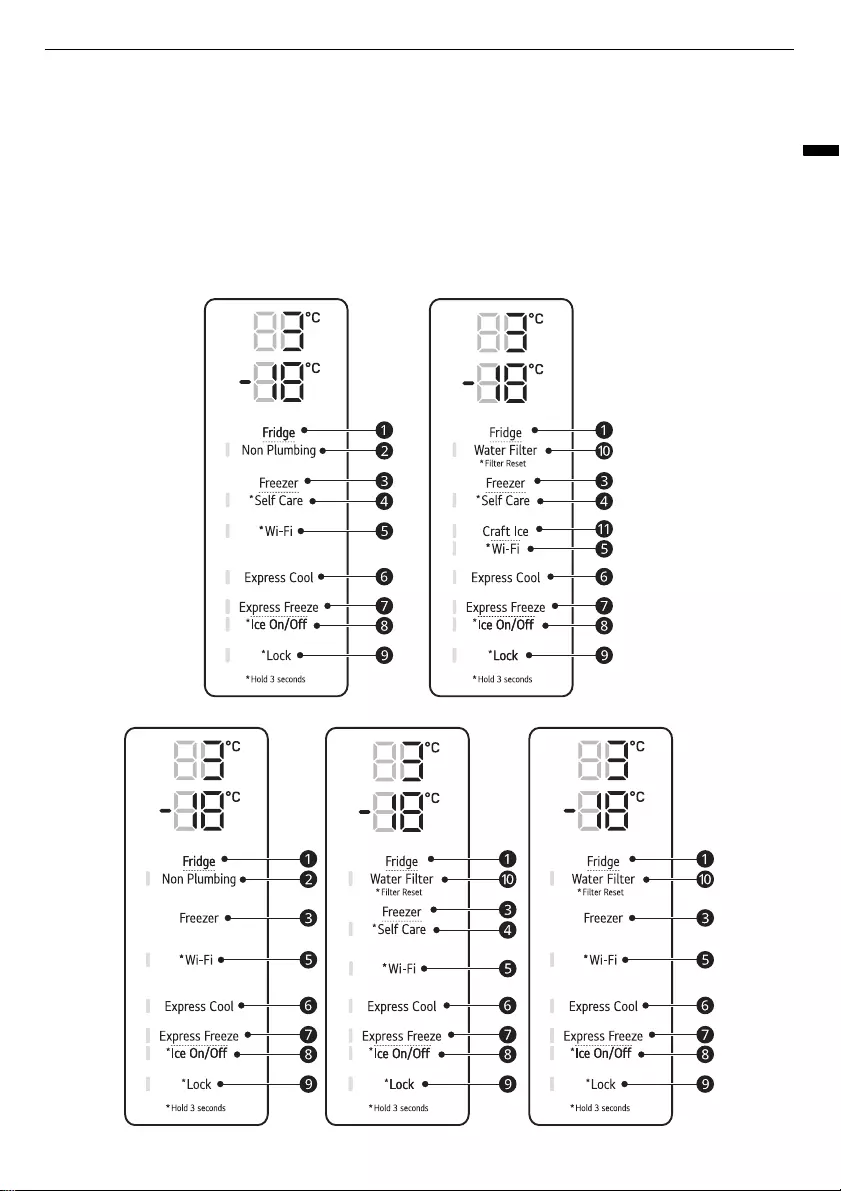
27
OPERATION
ENGLISH
Control Panel
The actual control panel may differ from model to model.
Control Panel and Functions
*1 This feature is only available on some models.
Control Panel
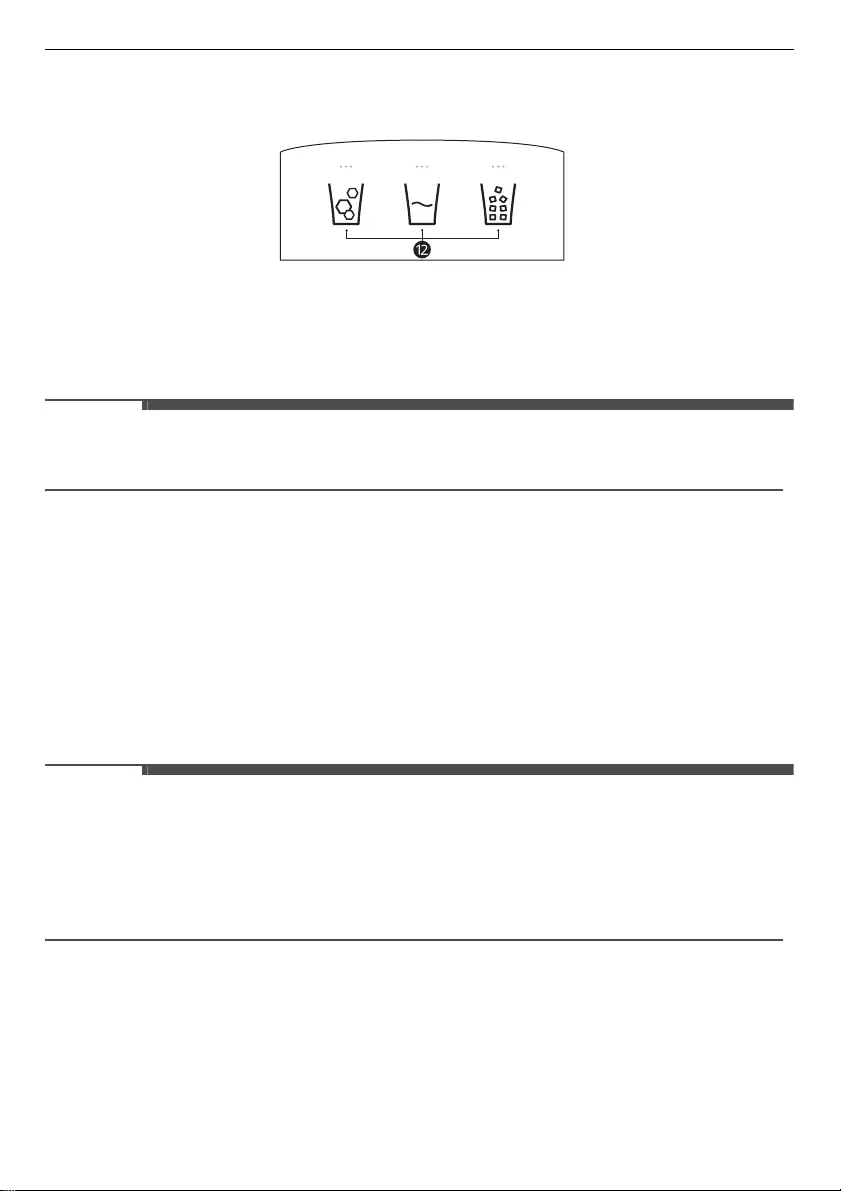
28
OPERATION
Dispenser Control Panel
a
Fridge
Press this button repeatedly to select a desired temperature between 1 °C and 7 °C.
• The default fridge temperature is 3 °C.
NOTE
• The actual inner temperature varies depending on the food status, as the indicated setting temperature
is a target temperature, not actual temperature within the appliance.
b
Non Plumbing
*1
The
Non Plumbing
icon is illuminated when the water dispenser tank is installed correctly.
c
Freezer
Press this button repeatedly to select a desired temperature between -23 °C and -15 °C.
• The default freezer temperature is -18 °C.
d
Self Care
*1
UV light is used to keep the water outlet clean. UV clean function runs automatically for 10 minutes
every hour or can be manually activated at anytime.
Press this button to activate it manually.
NOTE
• This function will momentarily stop each time the
Water
button is pressed if it is in operation and will
resume the function after 1 hour.
• This function runs automatically for 10 minutes every hour without pressing the
Self Care
button.
• When UV clean function is activated the LED on the dispenser control panel lights up.
•
UVnano
is a compound word derived from the words UV and its unit, nanometer.
e
Wi-Fi
This button allows the appliance to connect to a home Wi-Fi network. Refer to Smart Functions for
information on the initial setup of the
LG ThinQ
application.
f
Express Cool
This function can quickly cool a large amount of foods such as vegetable, fruit and so on.
• This function is enabled and disabled in turn each time you press the button.
• This function automatically terminates after a specific period has passed.

29
OPERATION
ENGLISH
g
Express Freeze
This function can quickly freeze a large amount of ice or frozen foods.
• Press the
Express Freeze
button to activate the function for 20 hours. The function automatically
shuts off after 20 hours.
• This function is enabled and disabled in turn each time you press the button.
• This function automatically terminates after a specific period has passed.
h
Ice On/Off
Press and hold the
Ice On/Off
button for three seconds to turn the automatic icemaker On/Off.
i
Lock
The lock function disables every other button on the display.
• To lock the control panel buttons, press and hold the
Lock
button for 3 seconds until indicator light
turns on and the function is activated.
• To disable the function, press and hold the
Lock
button for 3 seconds until the indicator light turns
off and the function is deactivated.
j
Water Filter
*1
Replace the water filter when the indicator light turns on.
k
Craft Ice
*1
Press the
Craft Ice
button to set to
6 ICE
,
3 ICE
or
OFF
.
NOTE
• For more ice, select the
6 ICE
mode. For clearer ice, select the
3 ICE
mode.
• To change the
Craft Ice
mode:
1) Press the
Craft Ice
button and the current mode appears.
2) Press the
Craft Ice
button repeatedly to select a desired
Craft Ice
mode.
3) After 5 seconds of idle time, the last mode set will be saved, and the display will return to normal.
l
Water & Ice Type
*1
Select the desired dispenser mode from the buttons on the dispenser control panel. Press the
dispenser switch with a glass or other container to dispense cubed ice, water or crushed ice.
NOTE
• The displayed temperature is the target temperature, and not the actual temperature inside the
appliance.
• The actual temperature inside the appliance depends on the following factors: room temperature, the
amount of food and how often the doors are opened, where the appliance is. Set the temperatures by
considering these factors.
• If there is any finger or skin contacts to the control panel while cleaning it, the button function may
operate.
• This appliance incorporates an earth connection for functional purposes only.
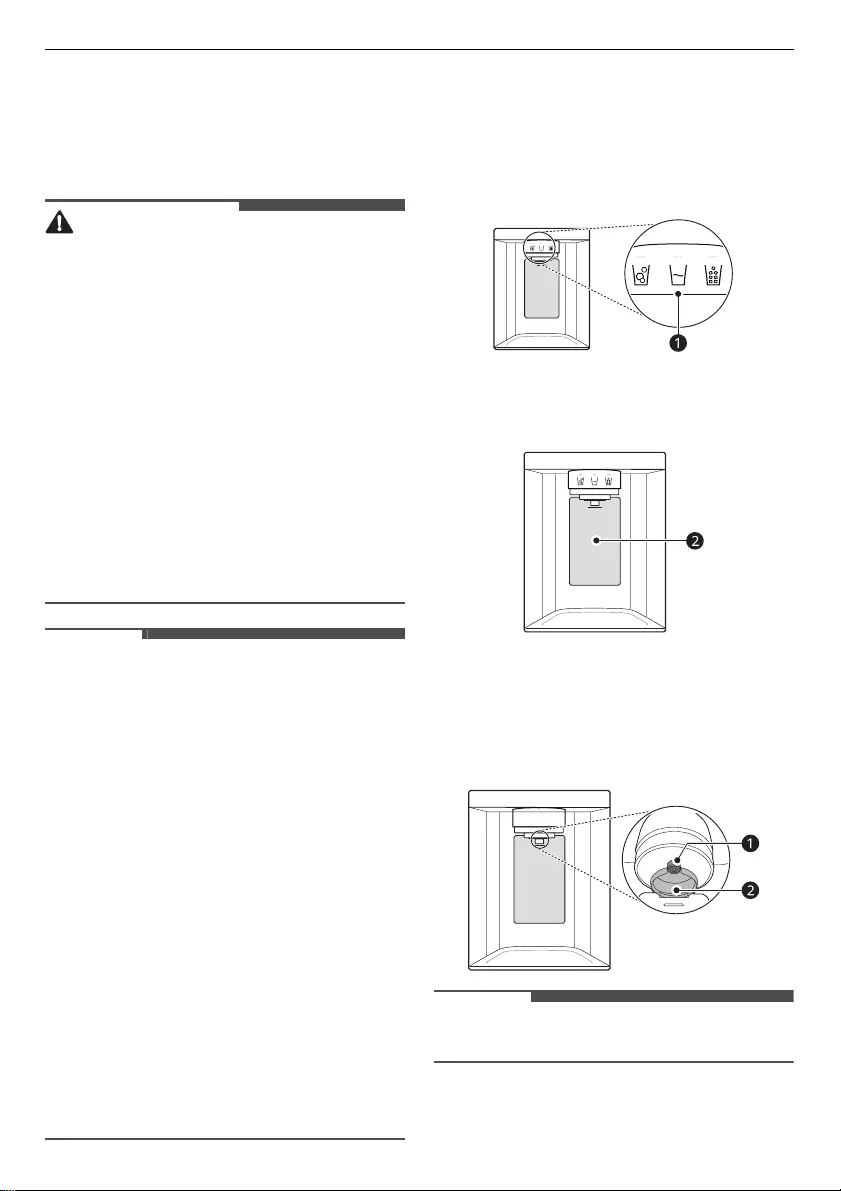
30
OPERATION
Ice and Water Dispenser
Before Using the Ice and Water
Dispenser
CAUTION
• Keep children away from the dispenser to
prevent children playing with or damaging the
controls.
• Throw away the first few batches of ice (about 20
cubes and 7 cups of water). This is also necessary
if the appliance has not been used for a long
time.
• Clean the water dispensing system if they have
not been used for 48 hours. Flush the water
system connected to a water supply if water has
not been drawn for 5 days.
• To clean the water dispensing system, flush the
water through the dispenser about 5 minutes
and throw away the first few batches of ice.
• Do not use a thin crystal cup or chinaware when
dispensing water or ice.
NOTE
• If you open the freezer door while water is being
dispensed, the water dispensing will stop.
• If you open the fridge door while water, cubed
ice or crushed ice is being dispensed, dispensing
will be paused. When you close the door, the
selected item will continue to be dispensed.
• If the cup rim is small, water may splash out of
the glass or miss it completely.
• Use a cup with a rim of over 68 mm in diameter
when dispensing water, cubed ice or crushed ice.
• When the ice maker produces smaller ice cubes,
or the cubes become lumped together, the
amount of water supplied to the ice maker may
be low due to insufficient water in the water
tank. If ice is not used frequently or the freezer
set temperature is too warm, it may also lump
together.
• It is normal for milky / cloudy water to be
dispensed after replacing the water filter. This
air in the water will eventually clear and is safe to
drink during this transition.
Using the Ice and Water
Dispenser
1
Press the dispenser selection button
a
, and
then the LED above the icon that you want
illuminates.
2
Press the dispenser paddle
b
with a glass or
other container to dispense cubed ice, water or
crushed ice.
Cleaning the Dispenser
Cleaning the Ice and Water Outlet
Wipe the water outlet
a
or ice outlet
b
frequently
with a clean cloth as it may get dirty easily.
NOTE
• Lint from a cloth may adhere to the outlets.
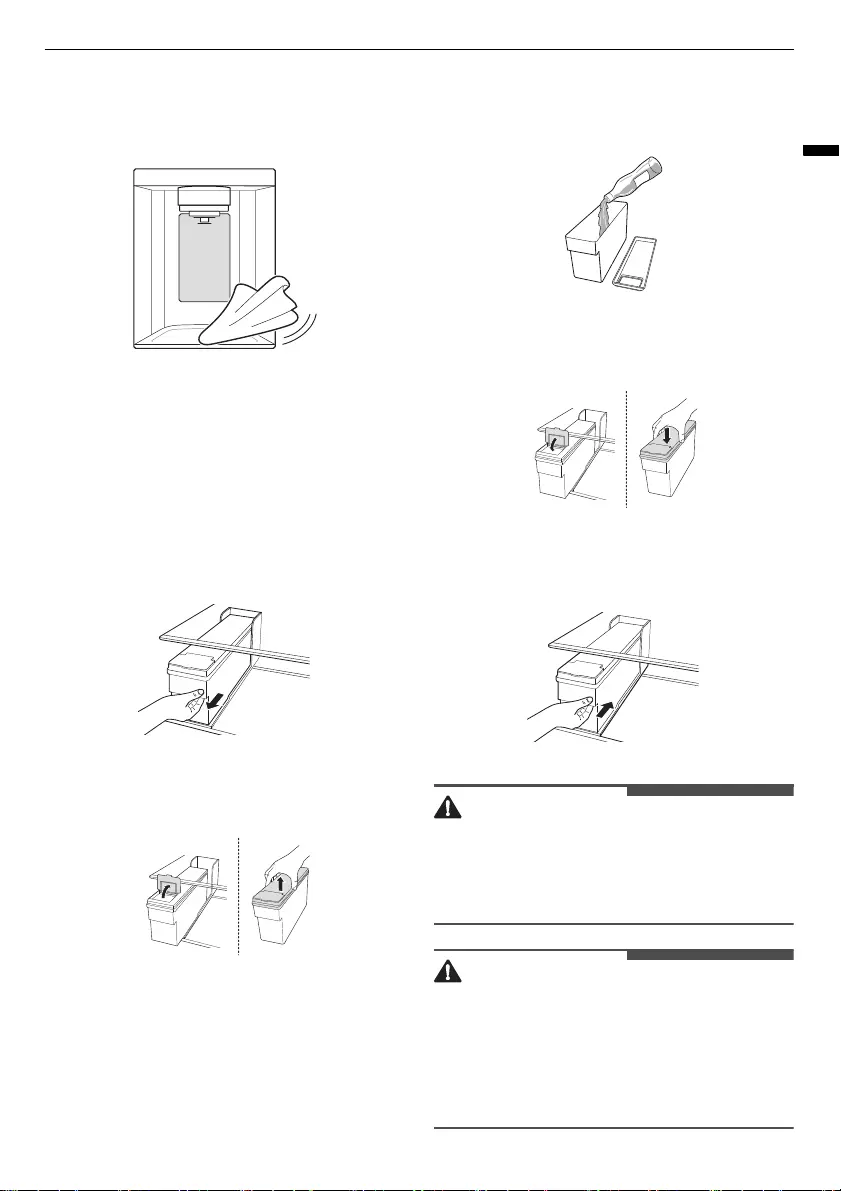
31
OPERATION
ENGLISH
Cleaning the Dispenser Tray
Wipe the entire area with a damp cloth. The
dispenser tray may become wet easily due to
spilled ice or water.
Filling the Water Tank with
Water
This feature is only available on some models.
The water tank holds the water to be dispensed or
used by the automatic icemaker to make ice.
1
Remove the water dispenser tank by pulling it
out while holding the handle.
2
Open the cover or cap of the water dispenser
tank.
3
Fill with bottle filtered or clean filtered water up
to the reference line indicated inside the water
dispenser tank. (Total capacity: 4 ℓ)
4
After filling with water, close the cover or cap of
the water dispenser tank.
5
Refit the water dispenser tank on the fridge
shelf.
WARNING
• Fill with potable water only into icemaker or
dispenser water tank.
• Do not fill the water tank with drinks other than
water or fill with hot water.
CAUTION
• Do not apply excessive force or impact when
removing or assembling the water dispenser
tank. Doing so can cause appliance damage or
injury.
• Children should not be allowed near the
dispenser tank.
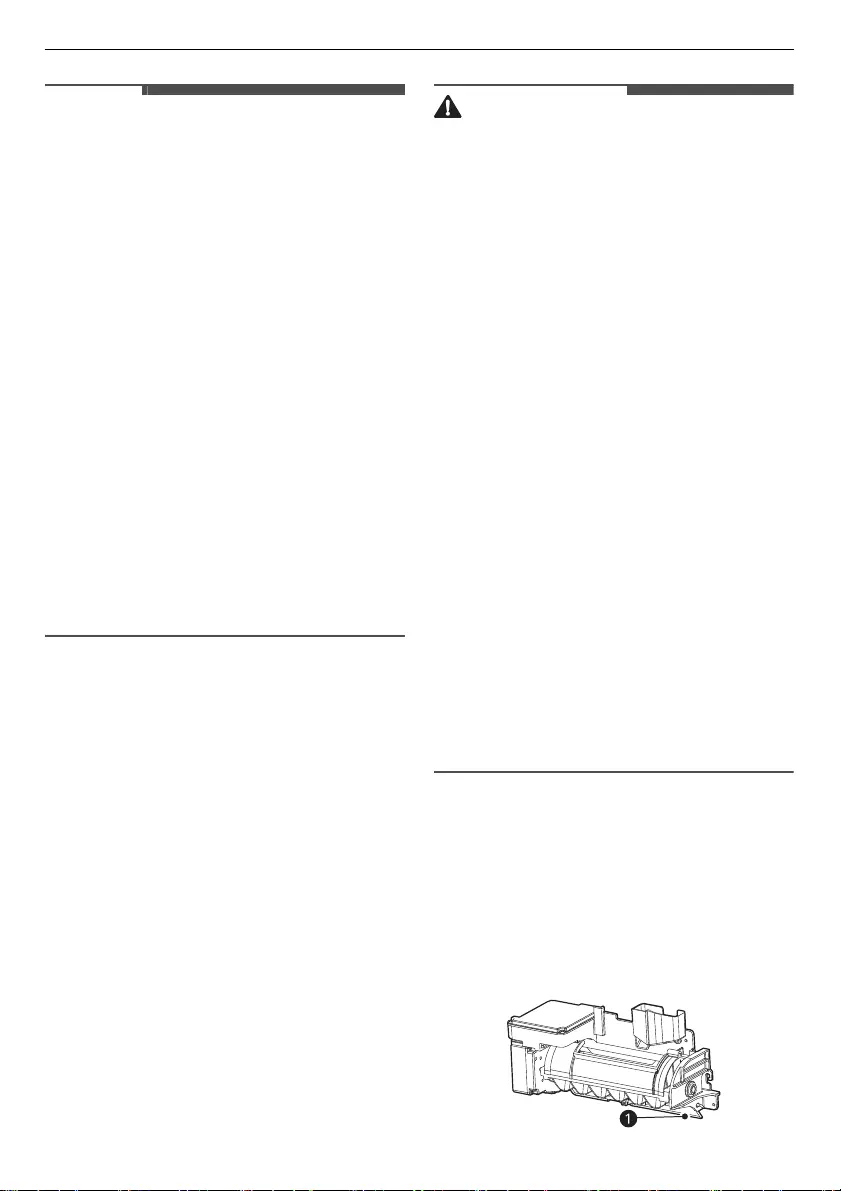
32
OPERATION
NOTE
• Before using the water dispenser tank after
installing the appliance, it should be washed
before filling it with water.
• Check if the water dispenser tank has been
placed on the appliance correctly. If it is not
assembled correctly, water may leak from the
tank into the appliance.
• If there is an insufficient amount of water in the
water dispenser tank, ice cube size and quantity
may be affected and may result in no ice being
made.
• If there is no water in the water dispenser tank,
the cold water and ice dispensing function of the
dispenser cannot be used. Check if there is water
in the water dispenser tank and then fill it with
water if there is not.
• Wait at least 15 seconds before removing the
water tank after having dispensed water or ice
from the dispenser.
• Sound from the water tank will be normal when
supplying water to the dispenser and the
Automatic Ice Maker. It is not a sign of
malfunction.
Automatic Icemaker
This feature is only available on some models.
This feature may vary depending on model
purchased.
Before Using the In-Door
Icemaker
• The icemaker produces ice normally when
approximately 48 hours have passed after the
appliance is initially installed.
• If the ice bin is completely filled with ice, ice
production will stop.
• Sound of ice dropping into the ice bin is normal.
• If ice cubes are stored in the ice bin for a long
period of time, they may clump together and
may not be separated easily. In such a case,
empty the ice bin and allow fresh ice to be made.
CAUTION
• It is normal for milky or cloudy water to be
dispensed after replacing the water filter. This
air in the water will clear eventually and is safe to
drink.
• The first ice and water dispensed may include
particles or odour from the water supply line or
the water tank.
• If discolored ice is dispensed, check the water
tank and the water supply for a possible source.
If the problem continues, contact the LG
Electronics customer information centre. Do not
use the ice or water until the problem is
corrected.
• Do not touch the ice outlet or the automatic
icemaker with your hand or a tool.
• Dispense ice into a glass before filling it with
water or other beverages. Splashing will occur if
ice is dispensed into a glass that already contains
liquid.
• Never use a glass that is exceptionally narrow or
deep. Ice may jam in the ice passage, affecting
the performance of the appliance.
• Keep the glass at a proper distance from the ice
outlet. A glass held too close to the outlet may
prevent ice from dispensing.
• Dispose of the ice inside the ice bin if you go on
vacation or if an extended power outage occurs.
Water from melting ice may drop from the
dispenser onto the floor.
In-Door Icemaker
The automatic icemaker can automatically make 70
- 182 cubes within a 24-hour period if conditions
are favourable. This amount may vary according to
the environment (ambient temperature around the
appliance, frequency of the door being opened,
amount of food stored in the appliance, etc.).
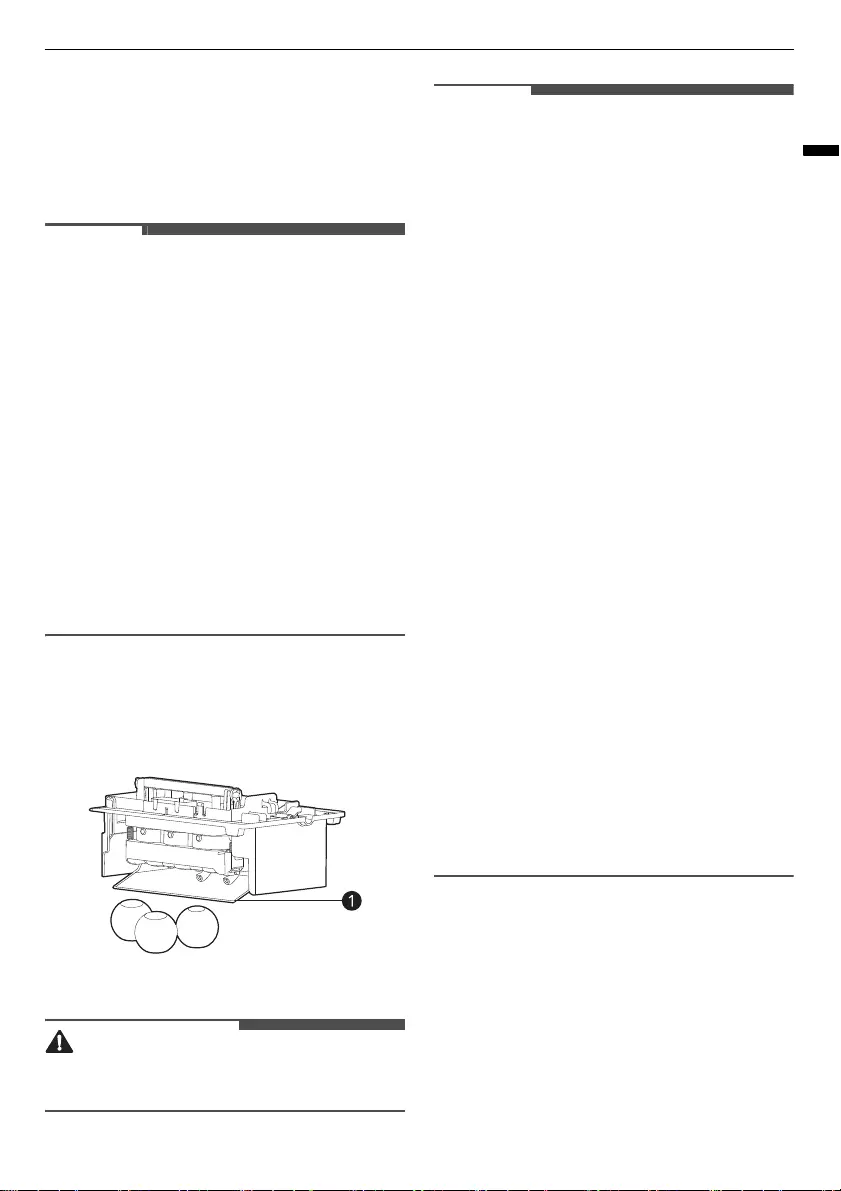
33
OPERATION
ENGLISH
a
Auto Shutoff (feeler arm)
Before Using the Freezer
Icemaker
NOTE
• The icemaker begins producing ice
approximately 48 hours after the appliance is
initially installed.
• Throw away the first few batches of ice after
installation.
• The sound of ice dropping into the ice bin is
normal.
• If the ice bin is completely filled with ice, ice
production will stop.
• The amount and shape of ice may vary according
to the environment (ambient temperature
around the appliance, frequency of the door
being opened, amount of food stored in the
appliance, water pressure, etc.).
• In the event of a power outage, throw away the
ice stored in the ice bin.
Freezer Icemaker (Craft Ice)
This feature is only available on some models.
a
Feeler Arm
CAUTION
• Do not insert round ice into the in-door ice bin,
as it can damage the ice and water dispenser.
NOTE
• The icemaker begins producing ice
approximately 48 hours after the appliance is
initially installed. The first batches of ice may not
be round and clear.
• Following installation or water filter
replacement, the first few batches of ice may be
semicircular or contain air bubbles.
• If the water pressure is less than 20 psi (138 kPa)
or a reverse osmosis system is used, the shape
of the ice may vary.
• The ice may look cloudy depending on the water
quality in the installation location and the
operating conditions.
• Throw away any shards of ice you may find in the
ice bin, as they may stick to the ice stored in the
ice bin.
• After a short term power outage, it will take
longer to make the first batch of ice, and the ice
may not be round. If the power will be out for a
longer period, throw away the ice stored in the
ice bin.
• The
Craft Ice
icemaker produces 1 batch of
round ice (3 pieces) at a time.
• In
3 ICE
mode, the
Craft Ice
icemaker produces
1 batch of round ice (3 pieces) about every 24
hours. In
6 ICE
mode, the
Craft Ice
icemaker
produces 2 batches of round ice (6 pieces total)
in the same period.
• For more ice, select the
6 ICE
mode. For clearer
ice, select the
3 ICE
mode.
• The time needed to make ice may vary according
to operating conditions.
• The ice bin stores 20 - 30 pieces of round ice.
Removing/Refitting the Ice
Storage Bin
The ice dispensing chute may become blocked with
frost if only crushed ice is used. Remove the frost
that accumulates by removing the ice bin and
clearing the passage with a rubber spatula.
Dispensing cubed ice periodically can also help
prevent frost buildup.
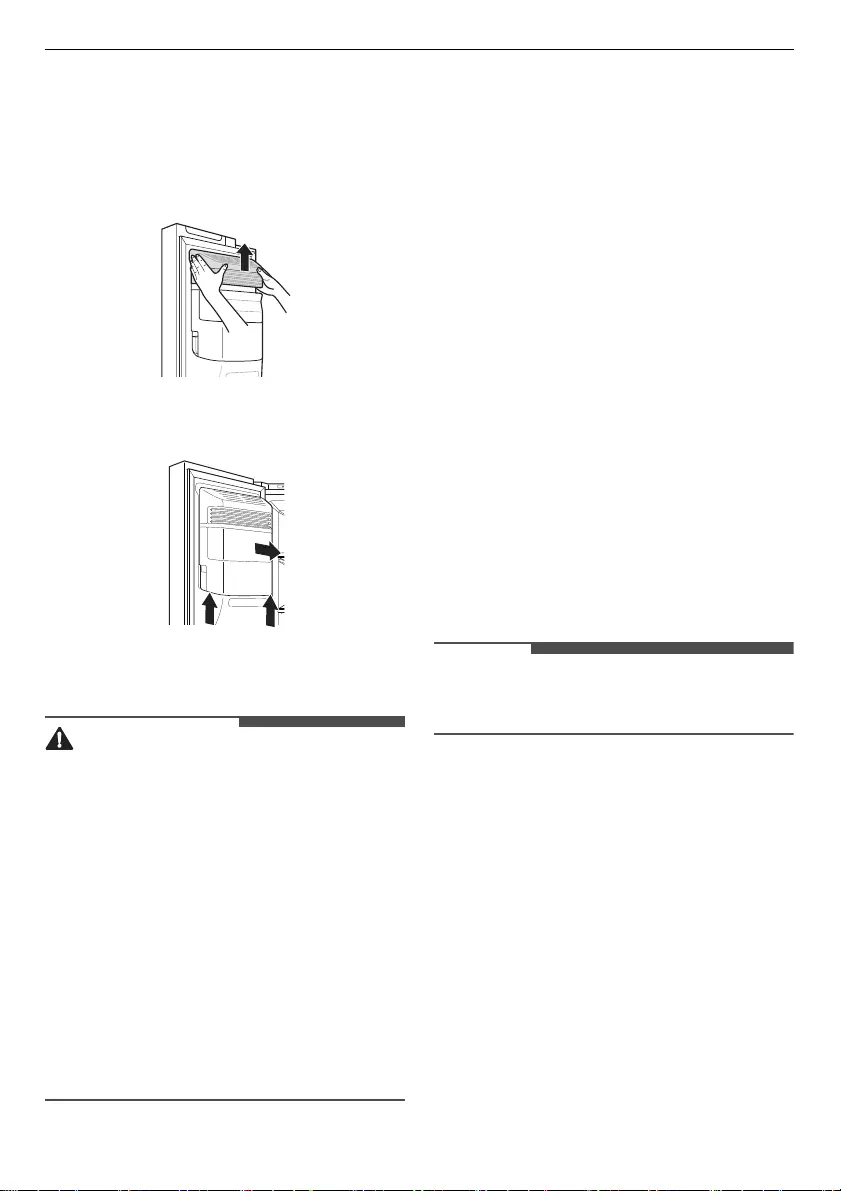
34
OPERATION
1
Turn off the automatic icemaker. Press and
hold the
Ice On/Off
button on the control
panel for 3 seconds.
2
Hold and remove the cover of the automatic
icemaker by lifting it upward.
3
Hold the ice bin with both hands and pull it out
while lifting it upward.
4
Refit the in-door ice bin in the reverse
sequence of their removal.
CAUTION
• Do not touch the automatic icemaker’s
mechanical parts with your hand or a tool.
Otherwise, appliance damage or injury may
occur.
• Do not disassemble, repair or alter the
automatic icemaker. These tasks should only be
done by a service technician.
• Caution should be taken, as the automatic
icemaker operates continuously after the freezer
door is opened when the automatic icemaker
switch is set to the on position.
• Keep children away from the dispenser.
• When refitting the ice bin, ensure that it is placed
correctly. If it is tilted or unlevel, it may not
continue to make ice due to sensor disruption.
Turning the Icemaker On/Off
To turn the automatic icemaker On/Off, press and
hold the
Ice On/Off
button on the control panel for
three seconds.
Normal Sounds You May Hear
• Keeping the power turned on to the icemaker
before the water line is connected can damage
the icemaker.
• The icemaker water valve buzzes as the icemaker
fills with water. If the
Ice On/Off
button is set to
On
, it will buzz even if it has not yet been hooked
up to water. To stop the buzzing, press the
Ice
On/Off
button to
Off
position.
• You will hear the sound of ice dropping into the
bin and water running in the pipes as the
icemaker refills.
Preparing for Vacation
Set the
Ice On/Off
button to Off and shut off the
water supply to the appliance.
NOTE
• The ice bin should be emptied any time the
Ice
On/Off
button is turned Off.
If the ambient temperature will drop below
freezing, have a qualified technician drain the
water supply system to prevent serious property
damage due to flooding caused by ruptured water
lines or connections.
InstaView
This feature is only available on some models.
Using the InstaView Door in
Door
The
InstaView Door in Door
lets you see if you’re
running low on frequently used items like

35
OPERATION
ENGLISH
beverages and snacks, without opening the fridge
door.
1
Knock twice on the glass to turn the LED light
inside the
Door in Door
on or off.
2
The LED light turns off automatically after ten
seconds.
CAUTION
• Do not open the door of the appliance with the
door in door open, or do not open the door in
door while the door of the appliance is open. The
door in door may be struck by the edge of the
appliance and damaged.
NOTE
• The
InstaView Door in Door
function is disabled
for 2 seconds after closing the left or right
freezer door, and momentarily disabled whilst
the ice dispenser is in use.
• Knock near the center of the glass. Knocking
near the edges of the glass may not activate the
InstaView Door in Door
function.
• Knock hard enough so that the knocking sound
is audible.
• The
InstaView Door in Door
function may
activate if a loud noise occurs near the
refrigerator.
• Clean the glass door with a dry cloth. To remove
stubborn stains, slightly moisten a clean cloth
with lukewarm water or a glass cleaner. Do not
spray glass cleaner directly at the glass door.
Door in Door
This feature is only available on some models.
Using the Door in Door
Pull the lever at the bottom of the door upwards
until the door in door opens.
There is plenty of storage space inside the door in
door and its surrounding baskets, allowing you to
store food in an organized manner.
CAUTION
• Do not open the door of the appliance with the
door in door open, or do not open the door in
door while the door of the appliance is open. The
door in door may be struck by the edge of the
appliance and damaged.
Drawer
CAUTION
• Always empty the drawers before removing
them, and use both hands when removing and
refitting them.
• Make sure that the fridge doors are fully open
before removing and refitting the drawers.
Using the Vegetable Drawer
The humidity in the vegetable crisper drawer can
be controlled by sliding the lever in either direction.
• If moved to the left side, the air guide will be
open and allow air to circulate through the
drawer for reduced humidity.
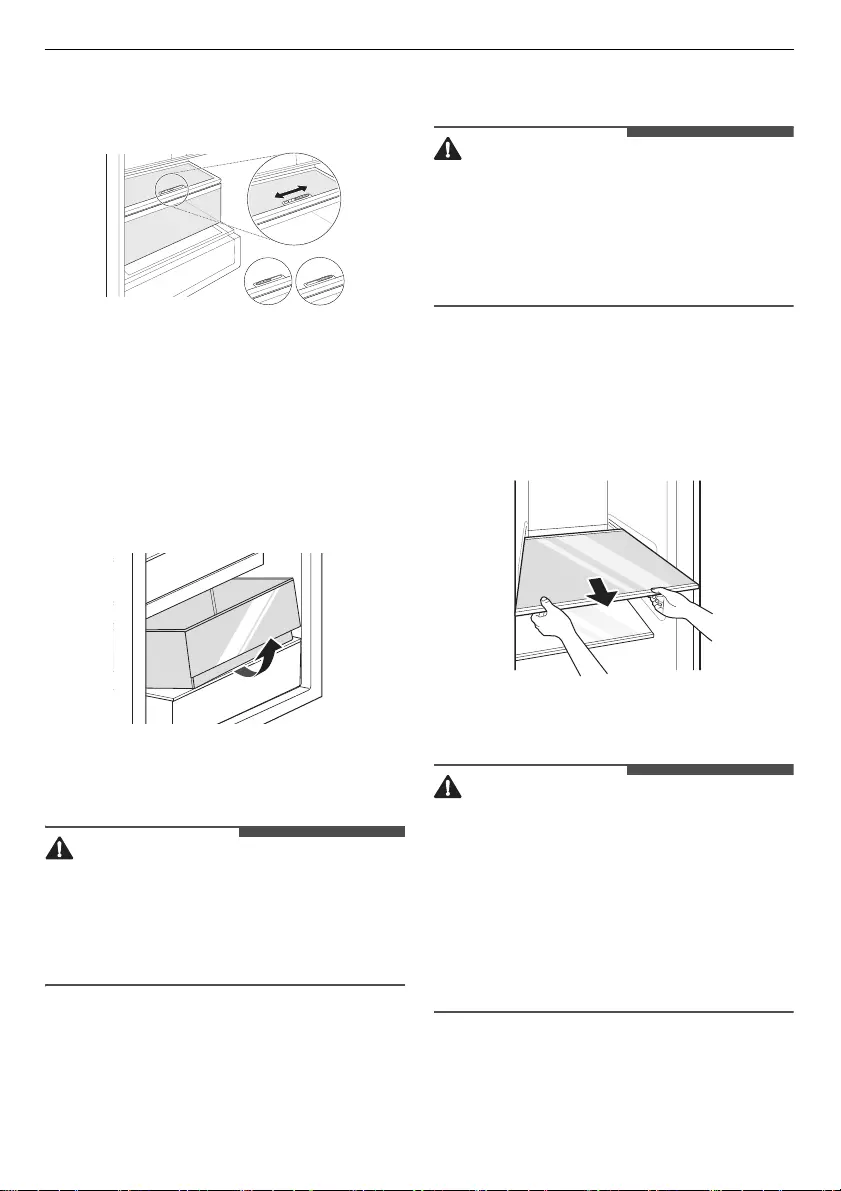
36
OPERATION
• If moved to the right side, the air guide will be
closed and will maintain any humidity that is
currently in the crisper drawer.
Removing/Refitting Drawers
1
Remove the contents of the drawer. Hold the
handle of the vegetable drawers and gently
pull them out.
2
Lift the vegetable drawer up and remove it by
pulling it out.
3
Refit the drawer in the reverse order of the
removal process.
CAUTION
• Always empty the drawers before removing
them, and use both hands when removing and
refitting them.
• Make sure that the fridge doors are fully open
before removing and assembling the drawers.
Shelf
CAUTION
• Glass shelves are heavy. Use special care when
removing them.
• Do not clean glass shelves with warm water
while they are cold. Shelves may break if
exposed to sudden temperature changes or
impact.
Removing/Refitting the Shelf
1
Tilt up the front of the shelf and then lift the
shelf straight up.
2
Pull the shelf out.
3
Mount them in the reverse order of the
removal process.
CAUTION
• Glass shelves are heavy. Use special care when
removing them.
• Do not clean glass shelves with warm water
while they are cold. Shelves may break if
exposed to sudden temperature changes or
impact.
• Make sure that shelves are level from one side to
the other. Failure to do so may result in the shelf
falling or food spilling.
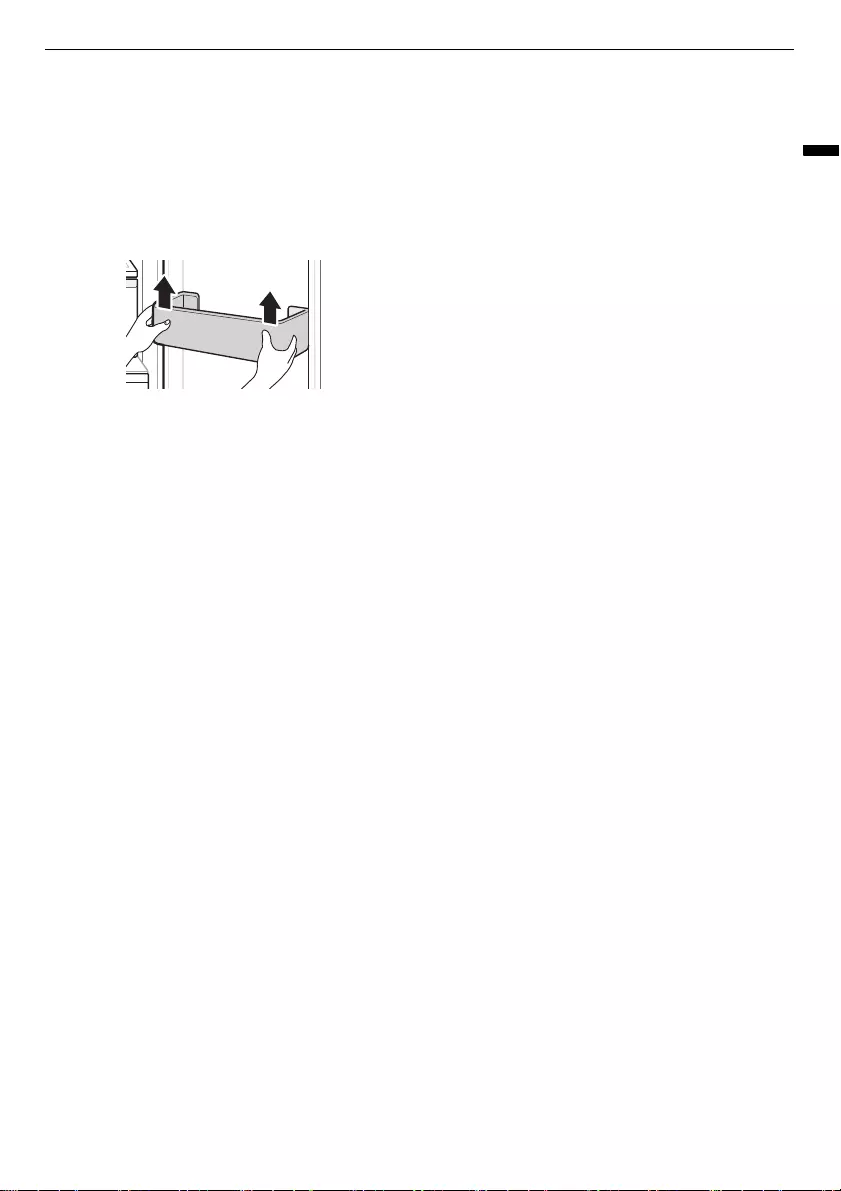
37
OPERATION
ENGLISH
Door Basket
Removing/Refitting the Door
Basket
1
Hold both edges of the basket and remove it by
lifting it upward.
2
Refit the door baskets in the reverse order of
the removal process.
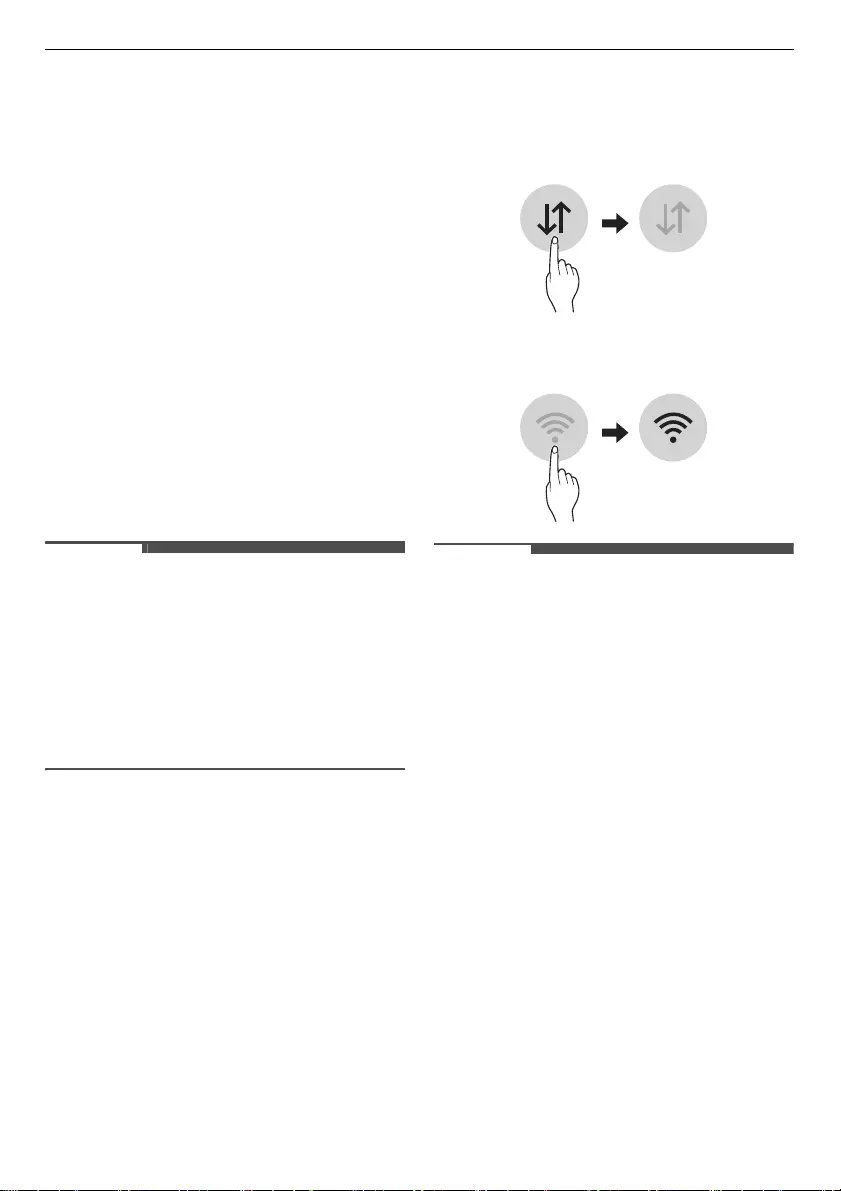
38
SMART FUNCTIONS
SMART FUNCTIONS
LG ThinQ Application
This feature is only available on models with Wi-Fi.
The
LG ThinQ
application allows you to
communicate with the appliance using a
smartphone.
LG ThinQ Application Features
Communicate with the appliance from a
smartphone using the convenient smart features.
Smart Diagnosis
• If you experience a problem while using the
appliance, this smart diagnosis feature will help
you diagnose the problem.
Settings
• Allows you to set various options on the
appliance and in the application.
NOTE
• If you change your wireless router, internet
service provider, or password, delete the
registered appliance from the
LG ThinQ
application and register it again.
• The application is subject to change for
appliance improvement purposes without notice
to users.
• Functions may vary by model.
Before Using LG ThinQ
Application
1
Check the distance between the appliance and
the wireless router (Wi-Fi network).
• If the distance between the appliance and
the wireless router is too far, the signal
strength becomes weak. It may take a long
time to register or installation may fail.
2
Turn off the
Mobile data
or
Cellular Data
on
your smartphone.
3
Connect your smartphone to the wireless
router.
NOTE
• To verify the Wi-Fi connection, check that the Wi-
Fi indicator on the control panel is lit.
• The appliance supports 2.4 GHz Wi-Fi networks
only. To check your network frequency, contact
your Internet service provider or refer to your
wireless router manual.
•
LG ThinQ
is not responsible for any network
connection problems or any faults,
malfunctions, or errors caused by network
connection.
• If the appliance is having trouble connecting to
the Wi-Fi network, it may be too far from the
router. Purchase a Wi-Fi repeater (range
extender) to improve the Wi-Fi signal strength.
• The Wi-Fi connection may not connect or may be
interrupted because of the home network
environment.
• The network connection may not work properly
depending on the Internet service provider.
• The surrounding wireless environment can
make the wireless network service run slowly.
• The appliance cannot be registered due to
problems with the wireless signal transmission.
Unplug the appliance and wait about a minute
before trying again.
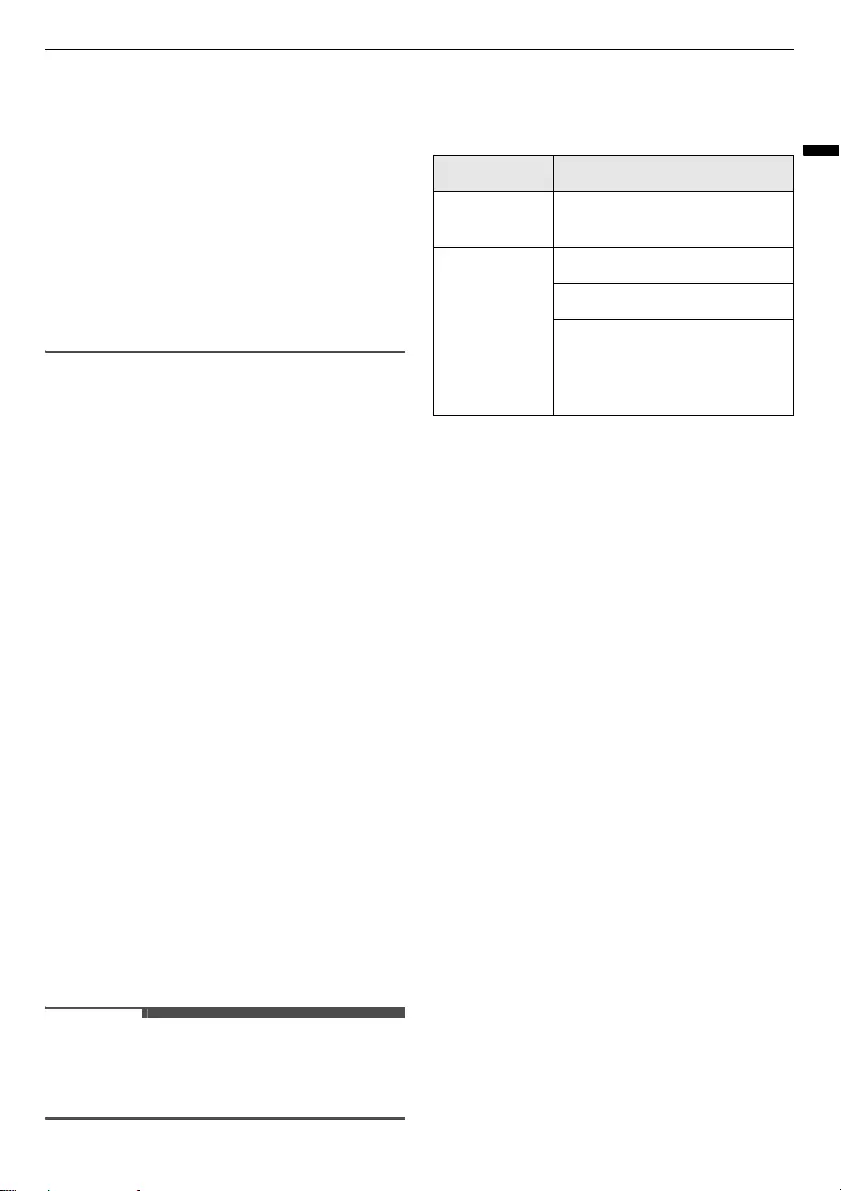
39
SMART FUNCTIONS
ENGLISH
• If the firewall on your wireless router is enabled,
disable the firewall or add an exception to it.
• The wireless network name (SSID) should be a
combination of English letters and numbers. (Do
not use special characters.)
• Smartphone user interface (UI) may vary
depending on the mobile operating system (OS)
and the manufacturer.
• If the security protocol of the router is set to
WEP
, you may fail to set up the network. Please
change it to other security protocols (
WPA2
is
recommended) and register the product again.
Installing the LG ThinQ
Application
Search for the
LG ThinQ
application from the
Google Play Store or Apple App Store on a
smartphone. Follow instructions to download and
install the application.
Connecting to Wi-Fi
The
Wi-Fi
button, when used with the
LG ThinQ
application, allows the appliance to connect to a
home Wi-Fi network. The Wi-Fi indicator shows the
status of the appliance’s network connection. The
Wi-Fi indicator illuminates when the appliance is
connected to the Wi-Fi network.
•
Initial Appliance Registration
Run the
LG ThinQ
application and follow the
instructions in the application to register the
appliance.
•
Re-registering the Appliance or Registering
Another User
Press and hold the
Wi-Fi
button for 3 seconds to
temporarily turn it off. Run the
LG ThinQ
application and follow the instructions in the
application to register the appliance.
NOTE
• To disable the Wi-Fi function, press and hold the
Wi-Fi
button for 3 seconds. The Wi-Fi indicator
will be turned off.
Wireless LAN Module
Specifications
Wireless function S/W version: V 1.0
For consideration of the user, this device should be
installed and operated with a minimum distance of
20 cm between the device and the body.
Open Source Software Notice
Information
To obtain the source code under GPL, LGPL, MPL,
and other open source licenses, that is contained in
this product, please visit https://
opensource.lge.com.
In addition to the source code, all referred license
terms, warranty disclaimers and copyright notices
are available for download.
LG Electronics will also provide open source code to
you on CD-ROM for a charge covering the cost of
performing such distribution (such as the cost of
media, shipping, and handling) upon email request
to opensource@lge.com. This offer is valid for a
period of three years after our last shipment of this
product. This offer is valid to anyone in receipt of
this information.
Smart Diagnosis
This feature is only available on models with the
c
or
d
logo.
Use this feature to help you diagnose and solve
problems with your appliance.
Model LCW-010
Frequency
Range
2412 - 2472 MHz
Output Power
(Max.)
IEEE 802.11 b: 18.06 dBm
IEEE 802.11 g: 18.95 dBm
IEEE 802.11 n (HT20): 18.43
dBm
IEEE 802.11 n (HT40): 17.96
dBm
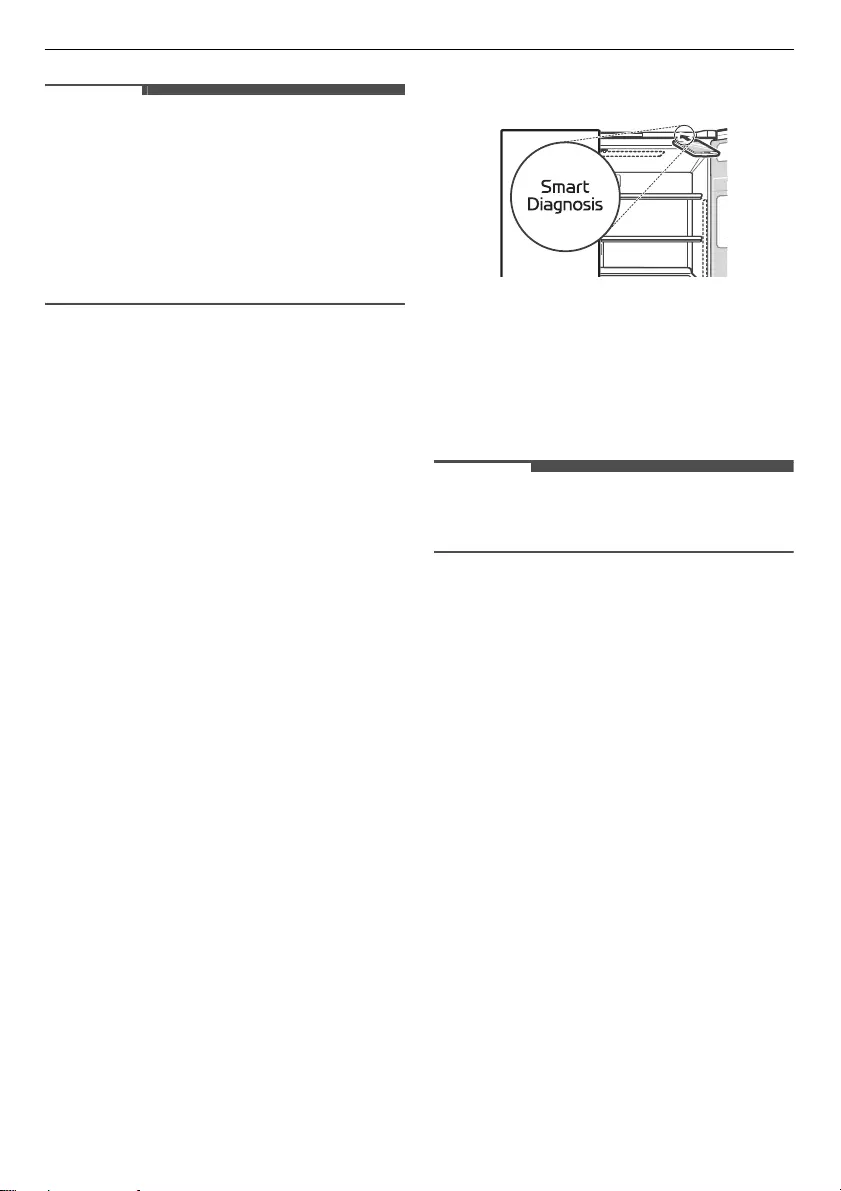
40
SMART FUNCTIONS
NOTE
• For reasons not attributable to LGE’s negligence,
the service may not operate due to external
factors such as, but not limited to, Wi-Fi
unavailability, Wi-Fi disconnection, local app
store policy, or app unavailability.
• The feature may be subject to change without
prior notice and may have a different form
depending on where you are located.
Using LG ThinQ to Diagnose
Issues
If you experience a problem with your Wi-Fi
equipped appliance, it can transmit
troubleshooting data to a smartphone using the
LG ThinQ
application.
• Launch the
LG ThinQ
application and select the
Smart Diagnosis
feature in the menu. Follow
the instructions provided in the
LG ThinQ
application.
Using Audible Diagnosis to
Diagnose Issues
Follow the instructions below to use the audible
diagnosis method.
• Launch the
LG ThinQ
application and select the
Smart Diagnosis
feature in the menu. Follow
the instructions for audible diagnosis provided
in the
LG ThinQ
application.
1
Press the
Lock
button to activate the lock
function.
• If the display has been locked for over 5
minutes, you must deactivate the lock and
then reactivate it.
2
Open the fridge door and then hold the phone
on the upper right speaker hole.
3
Press and hold the
Freezer
button for three
seconds or longer while holding your phone to
the speaker until the data transfer is complete.
4
After the data transfer is complete, the
diagnosis will be displayed in the application.
NOTE
• For best results, do not move the phone while
the tones are being transmitted.
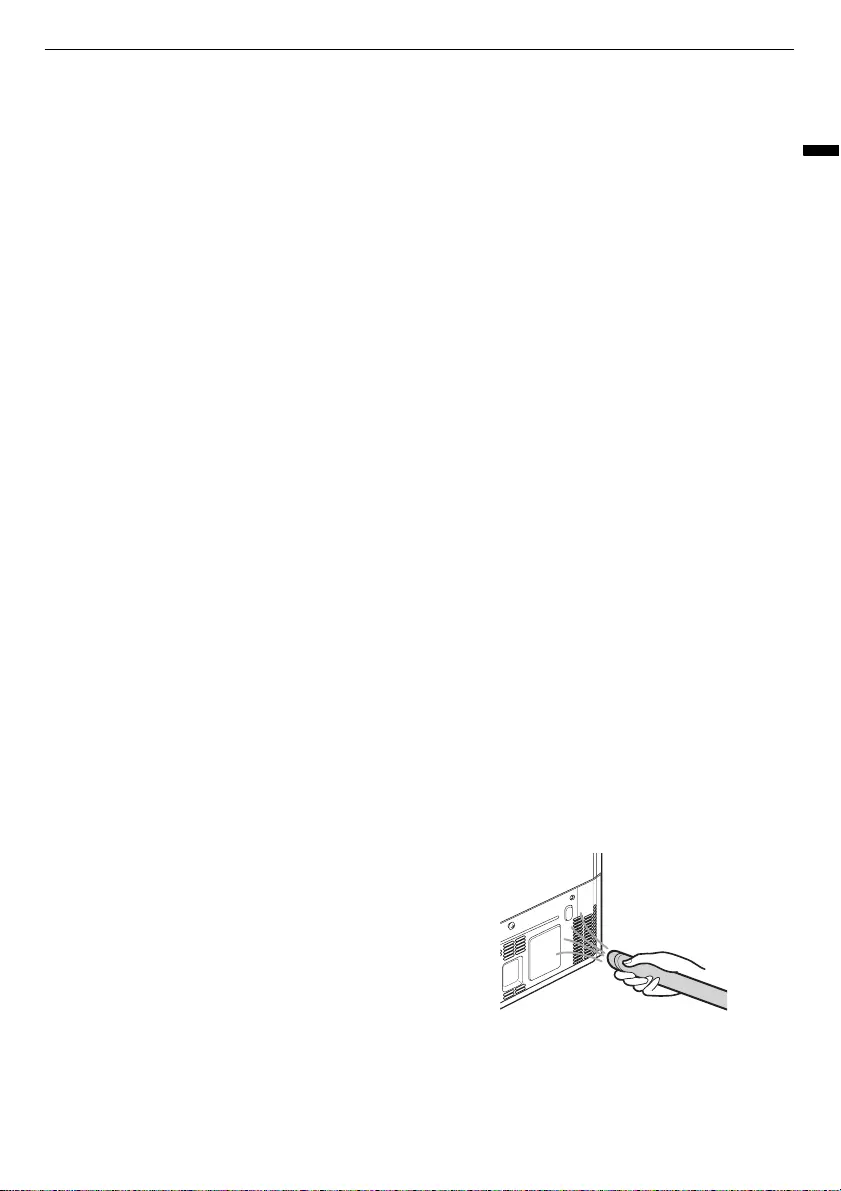
41
MAINTENANCE
ENGLISH
MAINTENANCE
Cleaning
General Cleaning Tips
• Performing manual defrosting, maintenance or
cleaning of the appliance while food is stored in
the freezer can raise the temperature of the food
and reduce its storage life.
• Regularly clean any surfaces that can come in
contact with food.
• When cleaning the inside or outside of the
appliance, do not wipe it with a rough brush,
toothpaste, or flammable materials. Do not use
cleaning agents containing flammable
substances. This may cause discolouration or
damage to the appliance.
- Flammable substances: alcohol (ethanol,
methanol, isopropyl alcohol, isobutyl alcohol,
etc.), thinner, bleach, benzene, flammable
liquid, abrasive, etc.
• After cleaning, check if the power cable is
damaged.
Cleaning the Exterior
• When cleaning the outside air vents of the
appliance by means of vacuuming, then the
power cord should be unplugged from the outlet
to avoid any static discharge that can damage
the electronics or cause an electric shock.
Regular cleaning of the rear and side ventilation
covers is recommended to maintain reliable and
economical operation of the unit.
• Keep the air vents on the exterior of the
appliance clean. Blocked air vents can cause fire
or appliance damage.
• For the appliance exterior, use a clean sponge or
soft cloth and a mild detergent in warm water.
Do not use abrasive or harsh cleaners. Dry
thoroughly with a soft cloth. Do not use
contaminated cloths when cleaning the stainless
steel doors. Always use a dedicated cloth and
wipe in the same direction as the grain. This
helps reduce surface staining and tarnishing.
Cleaning the Interior
• When removing a shelf or drawer from inside
the appliance, remove all stored foods from the
shelf or drawer to prevent injury or damage to
the appliance. Otherwise, injury may occur due
to the weight of stored foods.
• Detach the shelves and drawers and clean them
with water, and then dry them sufficiently,
before replacing them.
• Regularly wipe the door gaskets with a wet soft
towel.
• Door basket spills and stains should be cleaned
as they can compromise storage ability of the
basket and could even be damaged.
• Never clean the shelves or containers in the
dishwasher. The parts may become deformed
due to the heat.
• The automatic defrosting system in the
appliance ensures that the compartment
remains free of ice buildup under normal
operating conditions. Users do not need to
defrost it manually.
Cleaning the Condenser Cover
Use a vacuum cleaner with a brush to clean the
condenser cover and vents. Do not remove the
panel covering the condenser coil area.
We recommend that this be done every 12 months
to maintain operating efficiency.
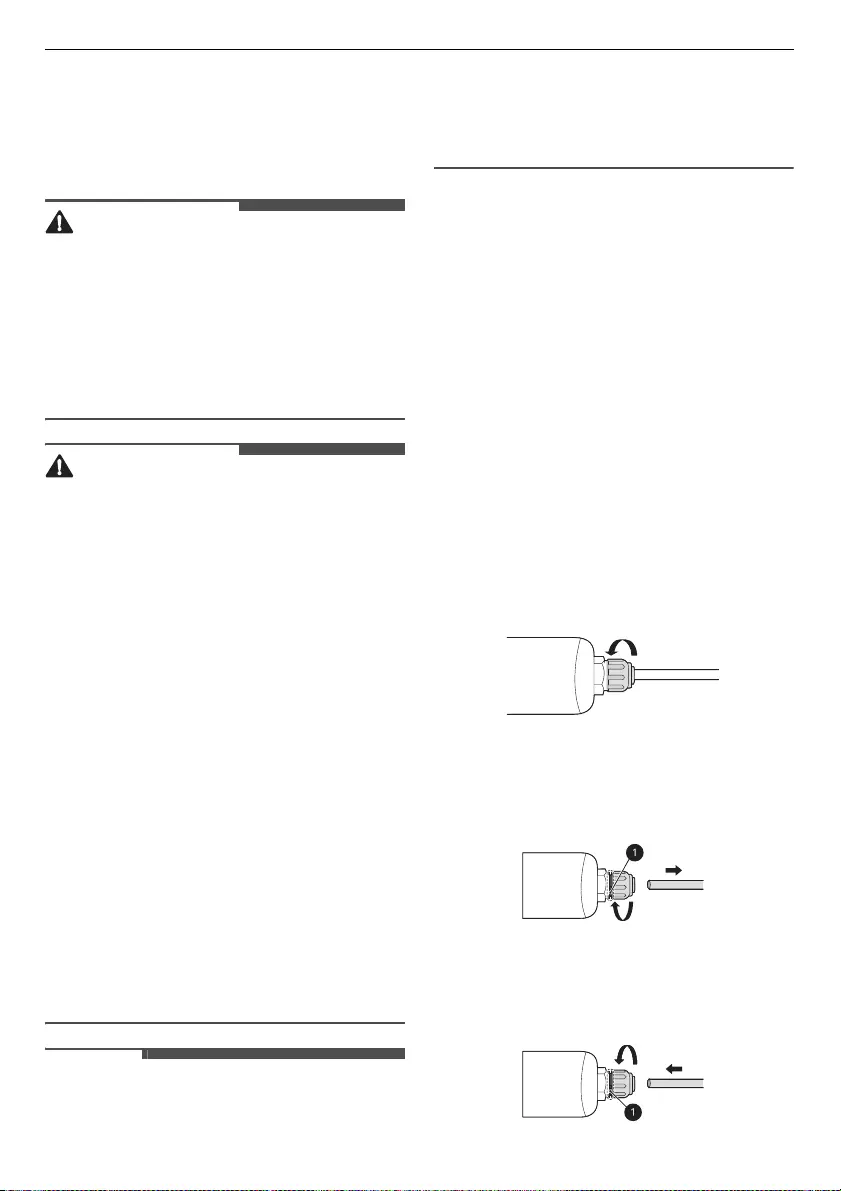
42
MAINTENANCE
Water Filter
Before Replacing the Water
Filter
WARNING
• Do not allow children to have access to small
parts during the installation of this product.
• Do not use with water that is microbiologically
unsafe or of unknown quality without adequate
disinfection before or after the system. Systems
certified for cyst reduction may be used on
disinfected water that may contain filterable
cysts.
CAUTION
• Do not install if water pressure exceeds 827 kPa.
If your water pressure exceeds 827 kPa, you
must install a pressure limiting valve. Contact a
plumbing professional if you are uncertain how
to check your water pressure.
• Do not install where water hammer conditions
may occur. If water hammer conditions exist,
you must install a water hammer arrester.
Contact a plumbing professional if you are
uncertain how to check for this condition.
• Do not install on hot water supply lines. The
maximum operating water temperature of this
filter system is 37.8 °C.
• Protect filter from freezing. Drain filter when
temperatures drop below 4.4 °C.
• The disposable filter cartridge MUST be replaced
every 6 months, at the rated capacity or if a
noticeable reduction in flow rate occurs.
• Where a backflow prevention device is installed
on a water system, a device for controlling
pressure due to thermal expansion must be
installed.
• Ensure all tubing and fittings are secure and free
of leaks.
NOTE
• While the testing was performed under standard
laboratory conditions, actual performance may
vary.
• It is essential that the manufacturer’s
recommended installation, maintenance and
filter replacement requirements be carried out
for the product to perform as advertised.
Replacing the Water Filter
(Plumbed Model)
*1 This feature is only available on some models.
The filter must be changed every 6 months or when
the indicator lights turns on or the water dispenser
output decreases.
• To purchase a replacement water filter:
- Use replacement cartridge: ADQ736939**
- Visit your local dealer or distributor or contact
the LG Electronics Customer Information
Centre. For further assistance, visit our
website at lg.com
Thread Nut Type
*1
1
Loose the screw cap.
2
Pull the pipe out from the water filter cap until
the colored line
a
is visble.
3
Push the pipe into the water fitler cap, making
sure the end is fully sealed.
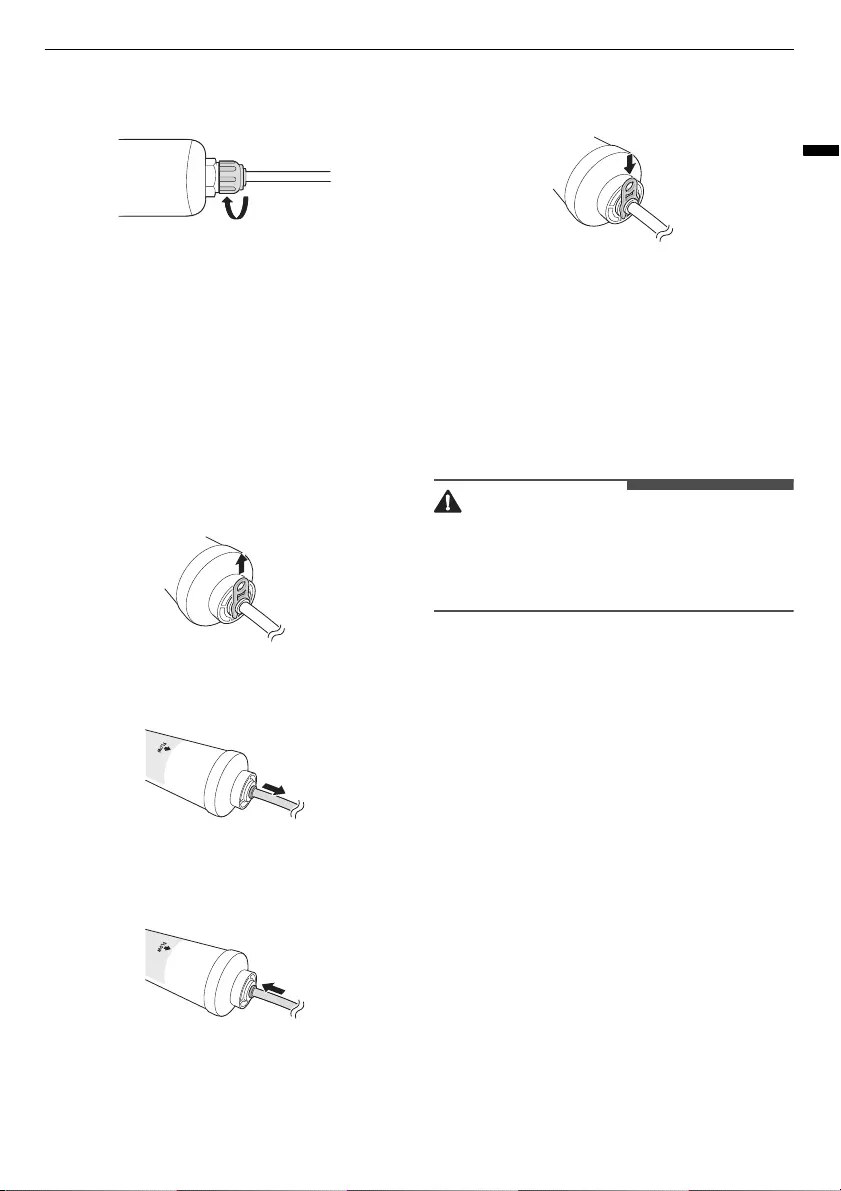
43
MAINTENANCE
ENGLISH
4
Tighten the screw cap until the colored line in
the water filter is no longer visible.
5
Press and hold the
Water Filter
button for
three seconds. That resets the
Replacement
Filter
icon. The new water filter has been
activated.
6
Dispense water for approximately 5 minutes to
remove trapped air and contaminants from the
system.
Push fit connector type
*1
1
Remove the screw cap.
2
Pull the pipe out from the water fitler.
3
Push the pipe into the water fitler, making sure
the end is fully sealed.
4
Insert the screw cap until the colored line in the
water filter is no longer visible.
5
Press and hold the
Water Filter
button for
three seconds. That resets the
Replacement
Filter
icon. The new water filter has been
activated.
6
Dispense water for approximately 5 minutes to
remove trapped air and contaminants from the
system.
CAUTION
• Failure to replace filters when required or using
non LG authorised water filters can cause the
filter cartridge to leak and result in property
damage.
Application Guidelines/Water
Supply Parameters
• Service Flow: 1,9 lpm
• Water Supply: Community or Private Well -
Potable Water
• Water Pressure: 138 - 827 kPa
• Water Temperature: 0,6 - 37,8 °C
• Capacity: 1 892 litres
Air Filter
Reusing the Air Filter
You can re-use the air filter by removing odors
from the air filter.
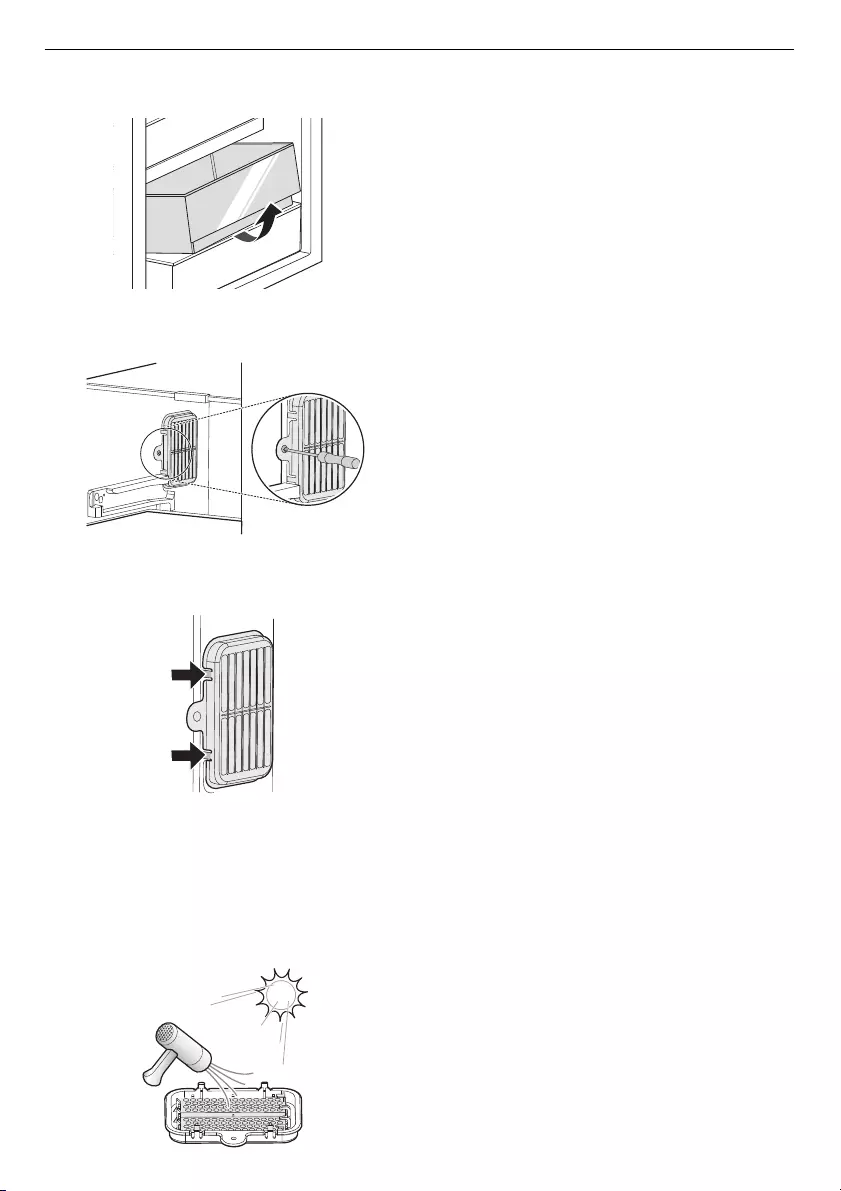
44
MAINTENANCE
1
Pull out the upper fridge drawer.
2
Unscrew the screw at the air filter.
3
Press on the hooks at the air filter and then
take it out.
4
Dry the air filter by using a hair dryer or by
leaving it in the sunlight.
• A natural palm wood powder is used for the
air filter to increase deodorizing
performance. Even if it falls off, it is not
harmful. Wipe it off with a towel or cloth.
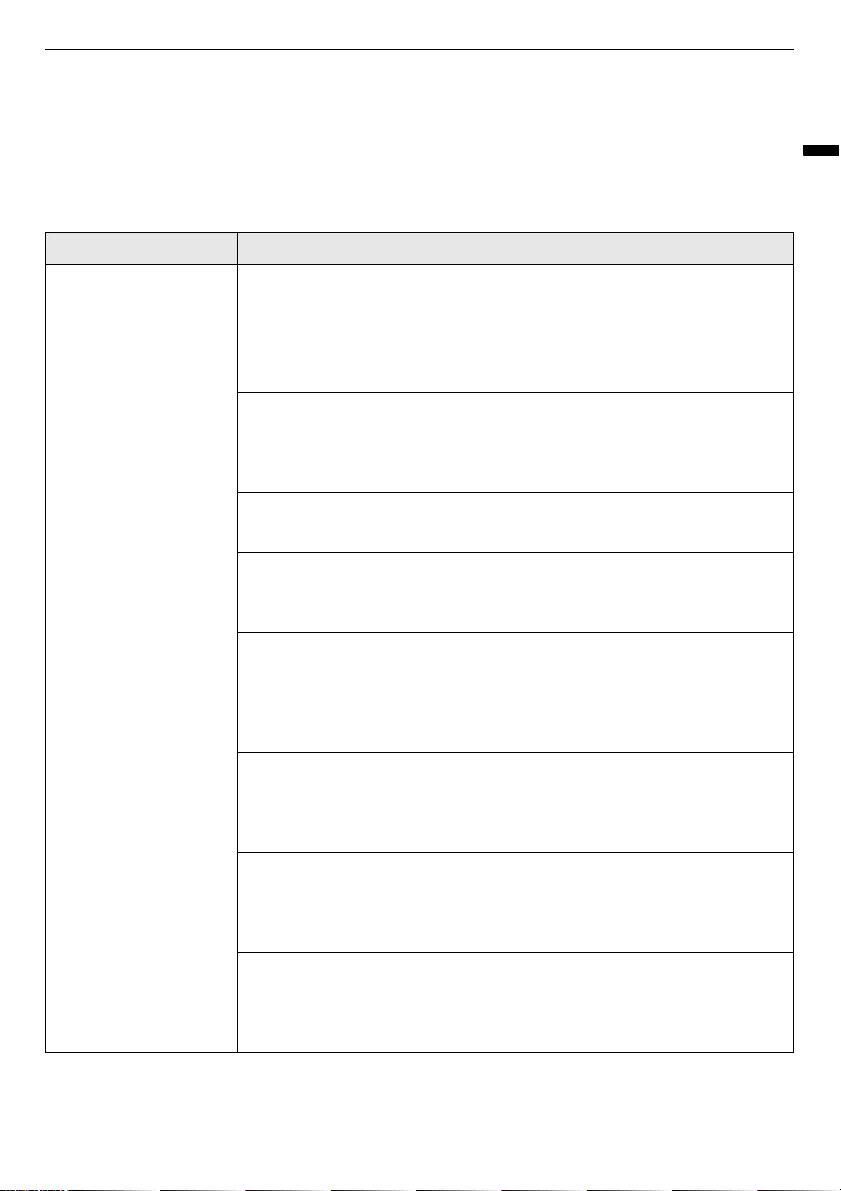
45
TROUBLESHOOTING
ENGLISH
TROUBLESHOOTING
Before Calling for Service
Ice & Water
Symptoms Possible Cause & Solution
The automatic
icemaker does not
produce ice or
produces a small
amount of ice.
Did you install the appliance recently?
• The ice maker produces ice normally when approximately 48 hours have
passed after the appliance is installed.
• If the fridge compartment temperature is too cold, the water filter can
freeze and block the water flow to the ice maker.
Did you connect the water supply pipe to the appliance and open the
supply valve?
• Connect the water supply pipe to the appliance and open the supply valve
completely.
Is the water supply hose bent?
• If the water supply hose is bent, the water flow could be compromised.
Have you dispensed a large amount of ice recently?
• It takes approximately 24 hours to produce more ice in the automatic
icemaker. Please wait.
Did you set the ice maker switch or the automatic icemaker button on
the control panel to ON?
• Press I on the automatic icemaker switch or set
ON
for the automatic
icemaker button on the control panel. (For more details on how to use, visit
LG Electronics website or use your smart device.)
Is the temperature of the freezer compartment set too high?
• If the set temperature is too warm, ice will be produced slowly or not at all.
Set the Freezer temperature to -18 °C for normal operation of the
automatic icemaker.
Have you been opening the appliance door frequently?
• If you open the appliance door frequently, cold air will escape, lowering
the speed of ice production. Do not open and close the appliance door
frequently.
Is the appliance door completely closed?
• If the appliance door is not completely closed, the temperature of the
freezer compartment will increase, slowing down the ice production
speed. Close the appliance door completely.
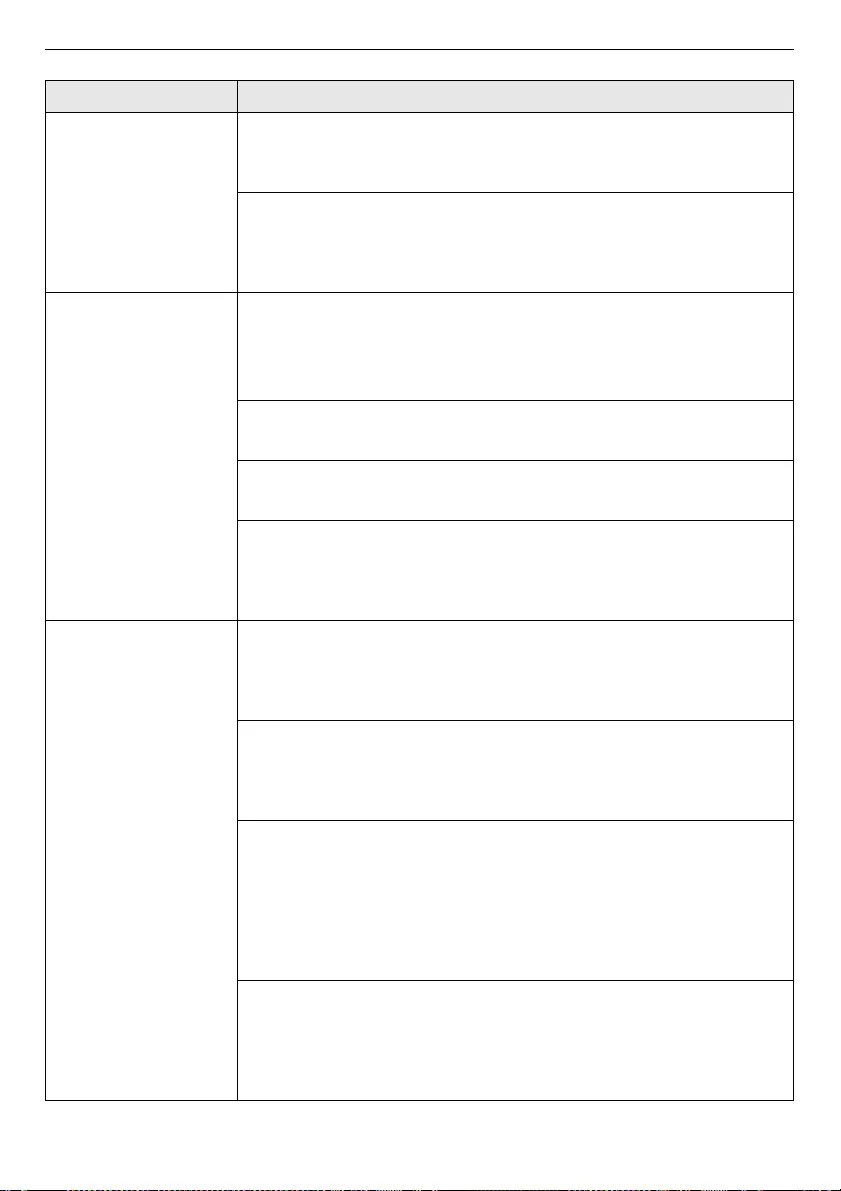
46
TROUBLESHOOTING
Ice is not dispensed. Unable to hear the sound of ice coming out?
• In the control panel, select the modes for cubed ice and crushed ice
alternately to dispense the ice.
Is the ice path blocked? (You can check the ice passage by separating the
ice bin.)
• Ice may not be dispensed properly if the ice passage is blocked. Check the
ice and clean the ice path regularly.
Water does not come
out.
The supply valve may be turned off. (For Plumbed models Only)
• Open the water supply valve.
• Check if the fridge compartment temperature is too cold, as the water
filter can freeze and block the water flow to the dispenser.
The water dispenser tank may be empty. (Non plumbed models only)
• Fill the water dispenser tank.
Is the water supply valve closed? (For Plumbed models Only)
• Open the water supply valve.
Are you using unfiltered water?
• Unfiltered water can contain a large amount of various heavy metals or
foreign substances, so the filter may be clogged in the early stage
regardless of the life of the filter.
Water tastes strange. Is the taste of water different when comparing it with the taste of water
from the previous water purifier?
• Has the purified water or cold water not been used for an extended period
of time?
Has it been a long time since you installed and replaced the filter?
• If an expired filter is used, the purification performance may decline. It is
recommended to replace the filter according to the filter replacement
period.
Have you flushed out the filter properly in the initial stage after
installing it?
• When you install or replace the filter for the first time, you need to remove
air and activated carbon residue from inside the filter. Use the appliance
after dispensing and discharging approximately 5 litres of purified water
from the dispenser by pressing the water dispensing lever. (Activated
carbon is harmless to humans.)
Has the purified water or cold water not been used for an extended
period of time?
• The taste of old water may change due to bacterial growth. Use the
product after dispensing and discharging approximately 5 litres
(approximately three minutes) from the water dispenser.
Symptoms Possible Cause & Solution
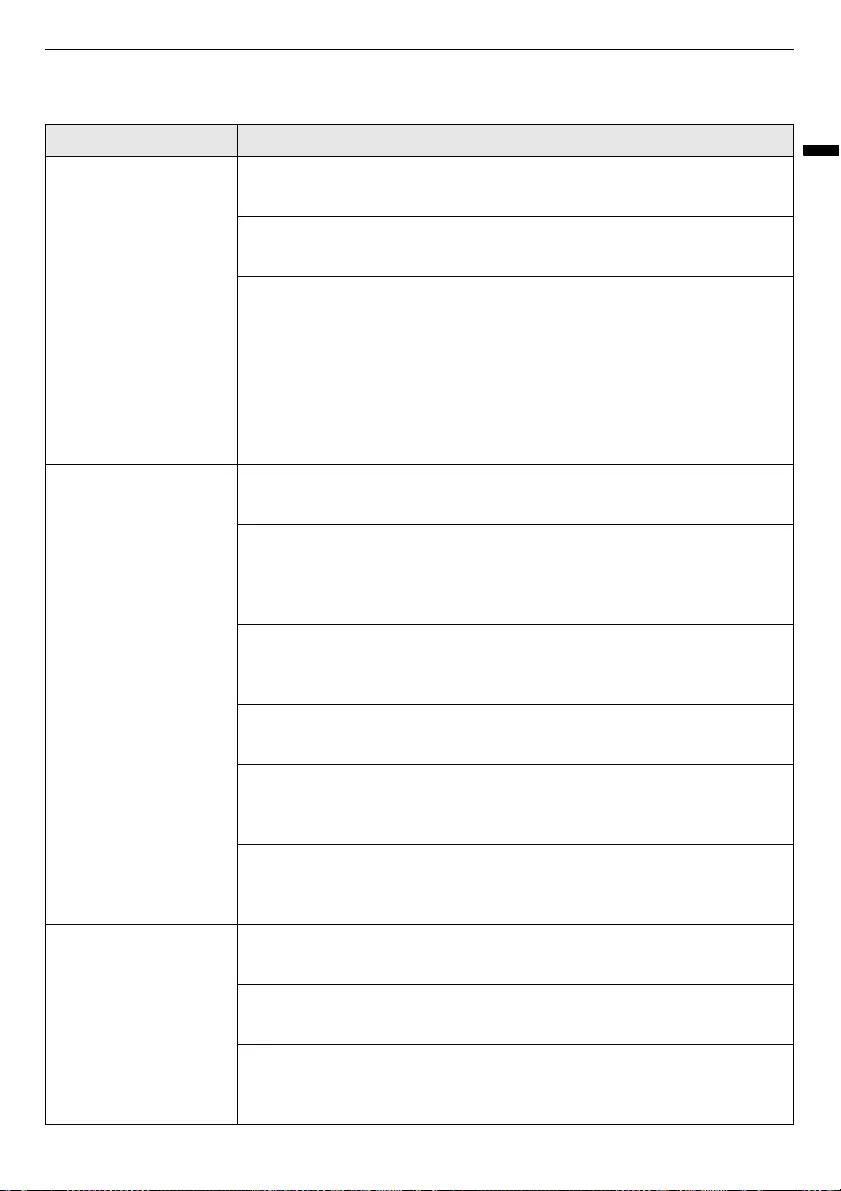
47
TROUBLESHOOTING
ENGLISH
Cooling
Symptoms Possible Cause & Solution
There is no
refrigeration or
freezing.
Is there a power interruption?
• Check the power of other appliances.
Check the power of other appliances.
• Plug the power plug in the outlet properly.
A fuse in your home may be blown or the circuit breaker tripped. Or the
appliance is connected to a GFCI (Ground Fault Circuit Interrupter)
outlet, and the outlet's circuit breaker has tripped.
• Check the main electrical box and replace the fuse or reset the circuit
breaker. Do not increase fuse capacity. If the problem is a circuit overload,
have it corrected by a qualified electrician.
• Reset the circuit breaker on the GFCI. If the problem persists, contact an
electrician.
There is poor
refrigeration or
freezing.
Is the fridge or freezer temperature set to its warmest setting?
• Set the fridge or freezer temperature to a colder setting.
Is the appliance in direct sunlight, or is it near a heat generating object
such as cooking oven or heater?
• Check the installation area and reinstall it away from heat generating
objects.
Did you store hot food without cooling it first?
• Cool the hot food first before putting it in the fridge or freezer
compartment.
Did you put in too much food?
• Maintain an appropriate space between food.
Are the appliance doors completely closed?
• Completely close the door and make sure that stored food is not
obstructing in the door.
Is there enough space around the appliance?
• Adjust the installation position to make enough space around the
appliance.
The appliance contains
a bad smell.
Is the fridge or freezer temperature set to 'Warm'?
• Set the fridge or freezer temperature to a colder setting.
Did you put in food with a strong smell?
• Store foods with strong smells in sealed containers.
Vegetables or fruit may have spoiled in the drawer.
• Throw away rotten vegetables and clean the vegetable drawer. Do not
store vegetables too long in the vegetable drawer.
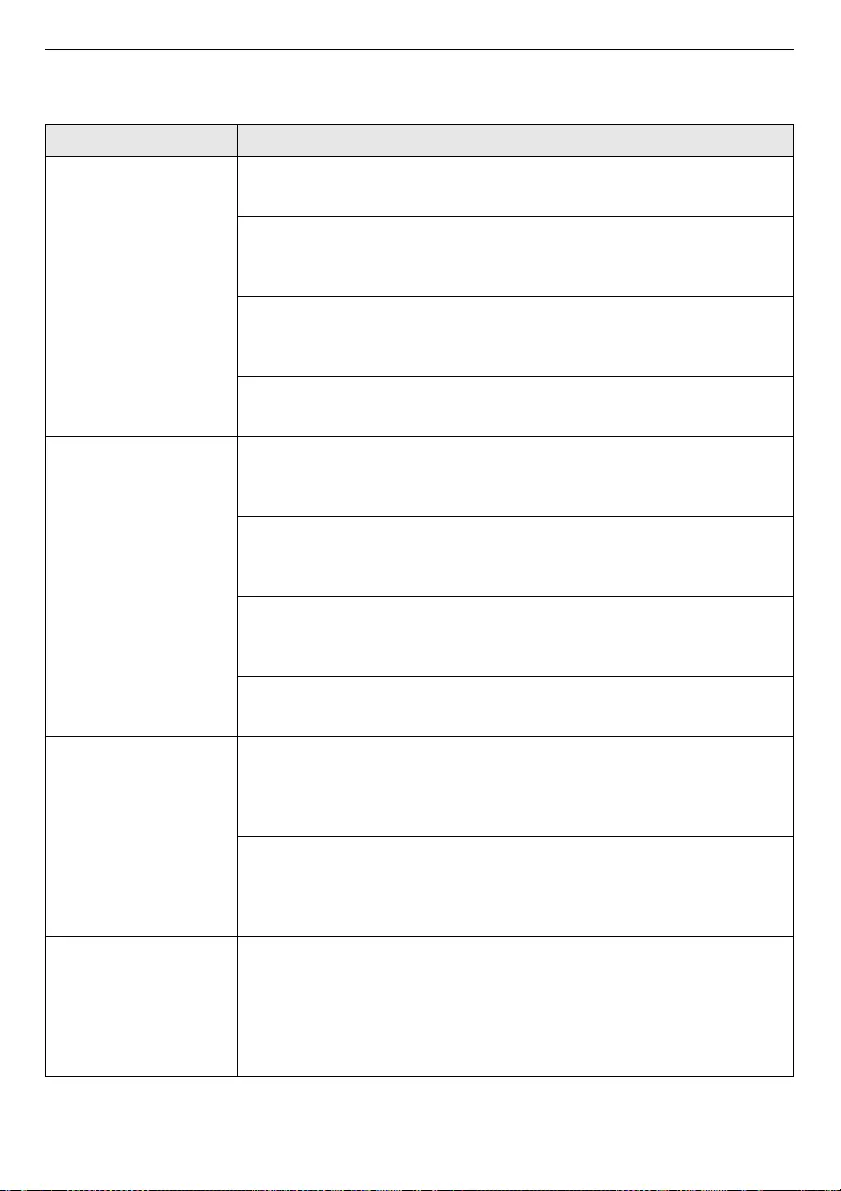
48
TROUBLESHOOTING
Condensation & Frost
Symptoms Possible Cause & Solution
There is condensation
inside the appliance or
on the bottom of the
vegetable drawer
cover.
Did you store hot food without cooling it first?
• Cool the hot food first before putting it inside the fridge or freezer.
Did you leave the appliance door open?
• Although the condensation will disappear soon after you close the
appliance door, you can wipe it with a dry cloth.
Do you open and close the appliance door too frequently?
• Condensation can form due to the temperature difference from the
outside. Wipe out the dampness with a dry cloth.
Did you put warm or moist food inside without sealing it in a container?
• Store food in a covered or sealed container.
Frost has formed in the
freezer compartment.
Doors may not be closed properly.
• Check if the food item inside the appliance is blocking the door and make
sure that the door is tightly closed.
Did you store hot food without cooling it first?
• Cool the hot food first before putting it in the fridge or freezer
compartment.
Is the air entry or exit of the freezer compartment blocked?
• Make sure that air entry or exit is not blocked so that the air can circulate
inside.
Is the freezer compartment overfilled?
• Maintain an appropriate space between items.
Frost or condensation
has formed inside or
outside the appliance.
Did you open and close the appliance door frequently or is the appliance
door improperly closed?
• Frosts or condensation can form if the outside air penetrates inside the
appliance.
Is the installation environment humid?
• Condensation can appear on the exterior of the appliance if the installation
area is too humid or on a humid day such as a rainy day. Wipe off any
moisture with a dry cloth.
The side or front of the
appliance is warm.
There are anti condensation pipes fitted to these areas of the appliance
to reduce condensation forming from around the door area.
• The heat releasing pipe to prevent condensation is installed on the front
and side of the appliance. You may feel it particularly hot right after the
appliance is installed or during the summer. You can be assured that this
is not a problem and is quite normal.
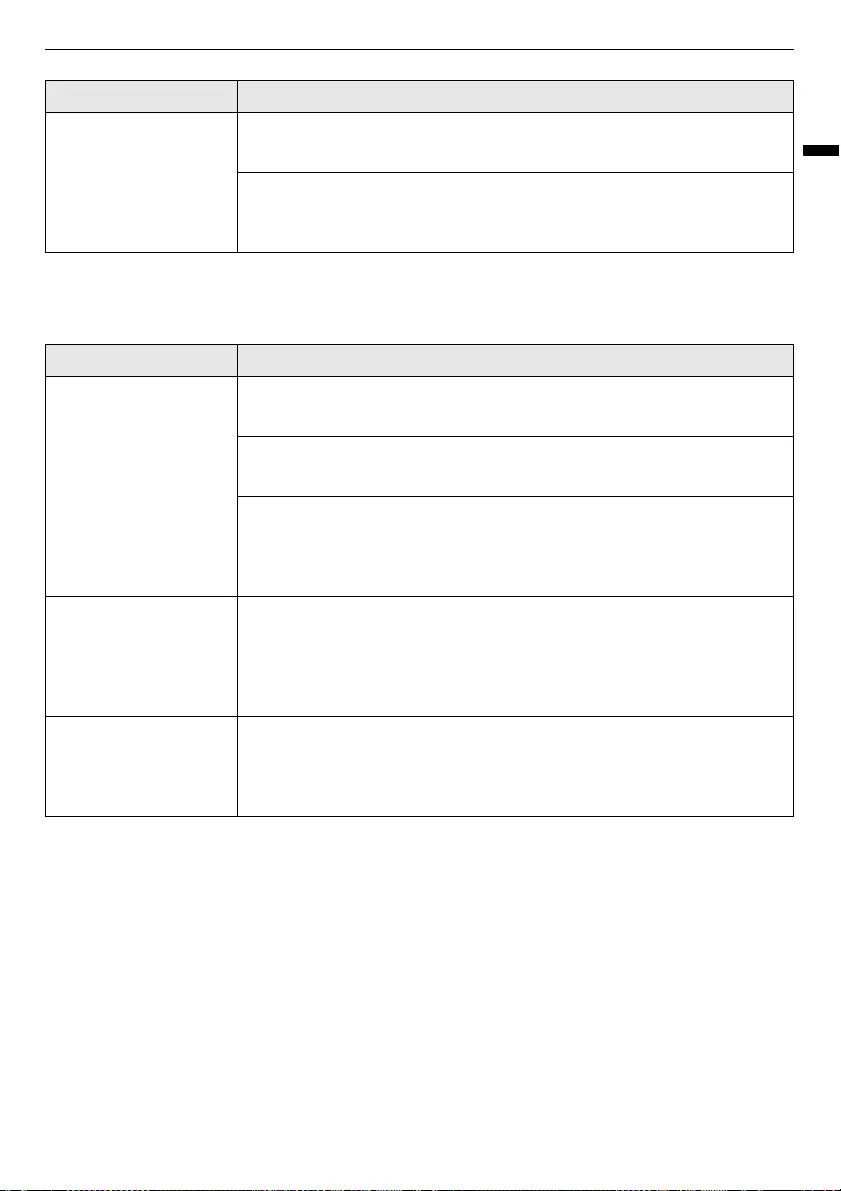
49
TROUBLESHOOTING
ENGLISH
Parts & Features
There is water inside or
outside of the
appliance.
Is there water leakage around the appliance?
• Check if the water has leaked from a sink or another place.
Is there water on the bottom of the appliance?
• Check if the water is from the thawed frozen food or a broken or dropped
container.
Symptoms Possible Cause & Solution
The appliance door is
not closed tightly.
Is the appliance leaning forward?
• Adjust the front feet to raise the front side slightly.
Were the shelves properly assembled?
• Refit the shelves if needed.
Did you close the door with excessive force?
• If you apply too much force or speed when closing the door, it may remain
briefly open before closing. Make sure that you do not slam the door
closed. Close the door gently.
It is difficult to open
the appliance door.
Did you open the door right after you closed it?
• If you try to open the appliance door within one minute after you closed it,
you may have difficulties because of the pressure inside the appliance. Try
to open the appliance door again in a few minutes so that the internal
pressure stabilizes.
The inside lamp in the
appliance does not
turn on.
Lamp failure
• Close the door and re-open. If the lamp does not turn on, please contact
the LG Electronics customer information centre. Do not attempt removal
of the lamp.
Symptoms Possible Cause & Solution
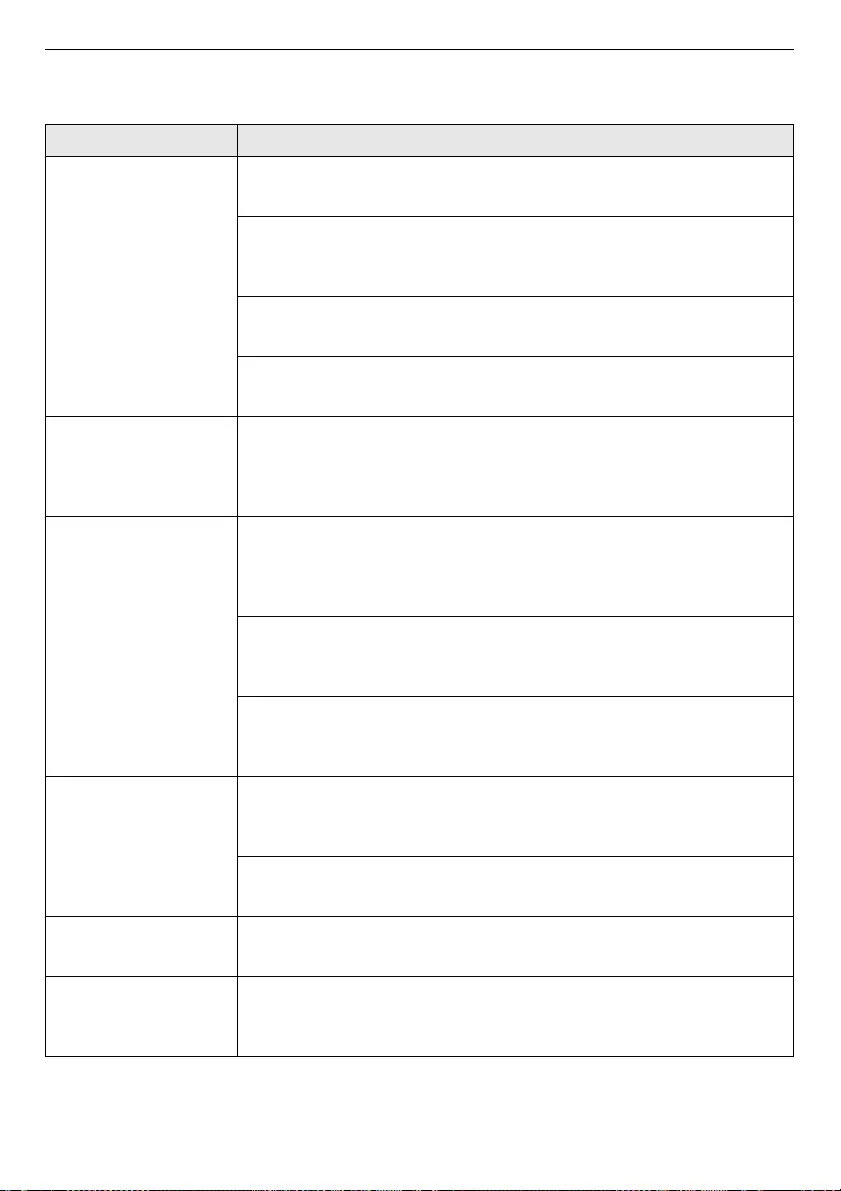
50
TROUBLESHOOTING
Noises
Symptoms Possible Cause & Solution
The appliance is noisy
and generates
abnormal sounds.
Is the appliance installed on a weak floor or improperly levelled?
• Install the appliance on a solid and flat area.
Does the rear of the appliance touch the wall?
• Adjust the installation position to allow enough clearance around the
appliance.
Are objects scattered behind the appliance?
• Remove the scattered objects from behind the appliance.
Is there an object on top of the appliance?
• Remove the object on top of the appliance.
Clicking noises The defrost control will click when the automatic defrost cycle begins
and ends. The thermostat control (or appliance control on some models)
will also click when cycling on and off.
• Normal Operation
Rattling noises Rattling noises may come from the flow of appliance, the water line on
the back of the unit (for plumbed models only), or items stored on top of
or around the appliance.
• Normal Operation
Appliance is not resting evenly on the floor.
• Floor is weak or uneven or levelling legs need to be adjusted. See the Door
Alignment section.
Appliance with linear compressor was moved while operating.
• Normal operation. If the compressor does not stop rattling after three
minutes, turn the power to the appliance off and then on again.
Whooshing noises Evaporator fan motor is circulating air through the fridge and freezer
compartments.
• Normal Operation
Air is being forced over the condenser by the condenser fan.
• Normal Operation
Gurgling noises Appliance flowing through the cooling system.
• Normal Operation
Popping noises Contraction and expansion of the inside walls due to changes in
temperature.
• Normal Operation
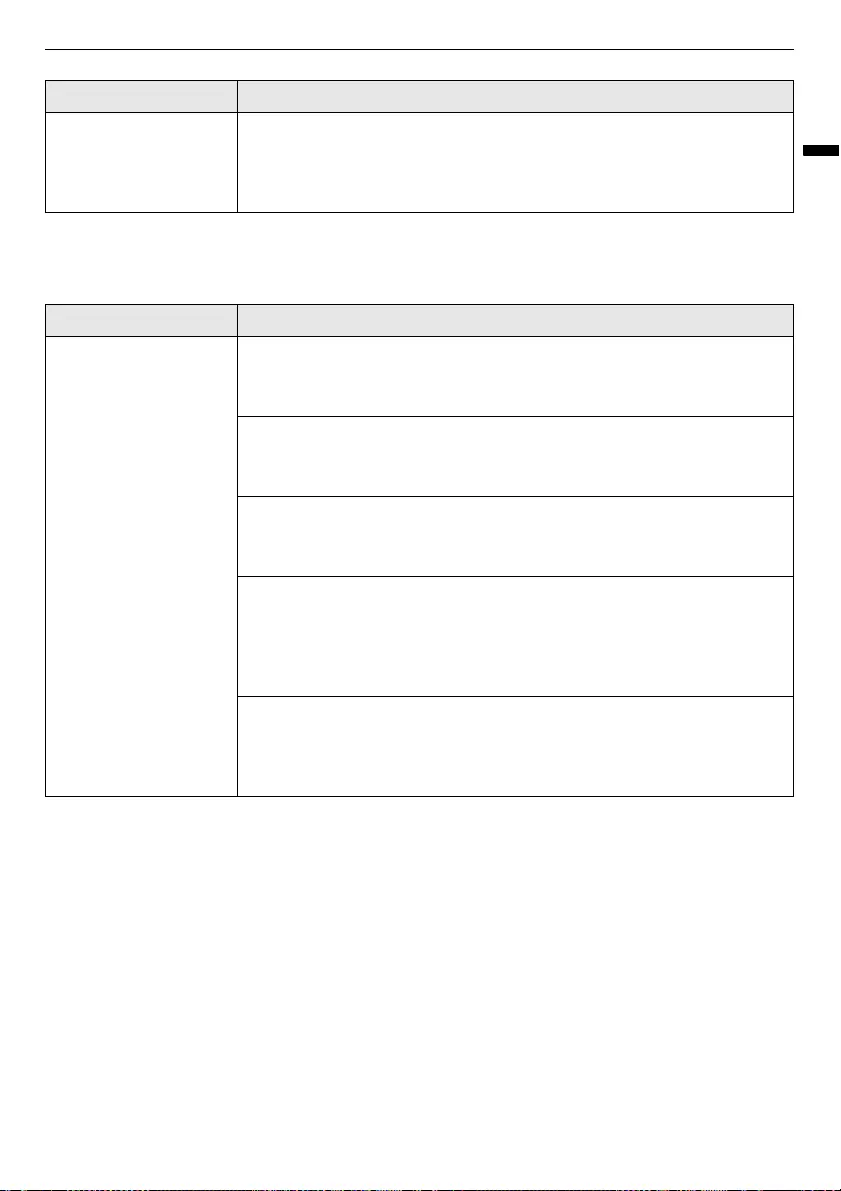
51
TROUBLESHOOTING
ENGLISH
Wi-Fi
Customer Care and Service
Contact an LG Electronics customer information centre.
• To find information on LG authorized service centre, visit our website at www.lg.com.
• Only qualified service personnel from LG authorized service centre should disassemble, repair, or
modify the appliance.
• Spare parts referenced in Regulation EU 2019/2019 are available for 7 years (only door gaskets are
available for 10 years).
• To purchase spare parts, contact an LG Electronics customer information centre or our website at
www.lg.com.
Vibrating If the side or back of the appliance is touching a cabinet or wall, some of
the normal vibrations may make an audible sound.
• To eliminate the noise, make sure that the sides and back do not make any
contact with any wall or cabinet.
Symptoms Possible Cause & Solution
Your home appliance
and smartphone are
not connected to the
Wi-Fi network.
The password for the Wi-Fi that you are trying to connect to is incorrect.
• Find the Wi-Fi network connected to your smartphone and remove it, then
register your appliance on
LG ThinQ
.
Mobile data for your smartphone is turned on.
• Turn off the
Mobile data
of your smartphone and register the appliance
using the Wi-Fi network.
The wireless network name (SSID) is set incorrectly.
• The wireless network name (SSID) should be a combination of English
letters and numbers. (Do not use special characters.)
The router frequency is not 2.4 GHz.
• Only a 2.4 GHz router frequency is supported. Set the wireless router to 2.4
GHz and connect the appliance to the wireless router. To check the router
frequency, check with your Internet service provider or the router
manufacturer.
The distance between the appliance and the router is too far.
• If the distance between the appliance and the router is too far, the signal
may be weak and the connection may not be configured correctly. Move
the location of the router so that it is closer to the appliance.
Symptoms Possible Cause & Solution
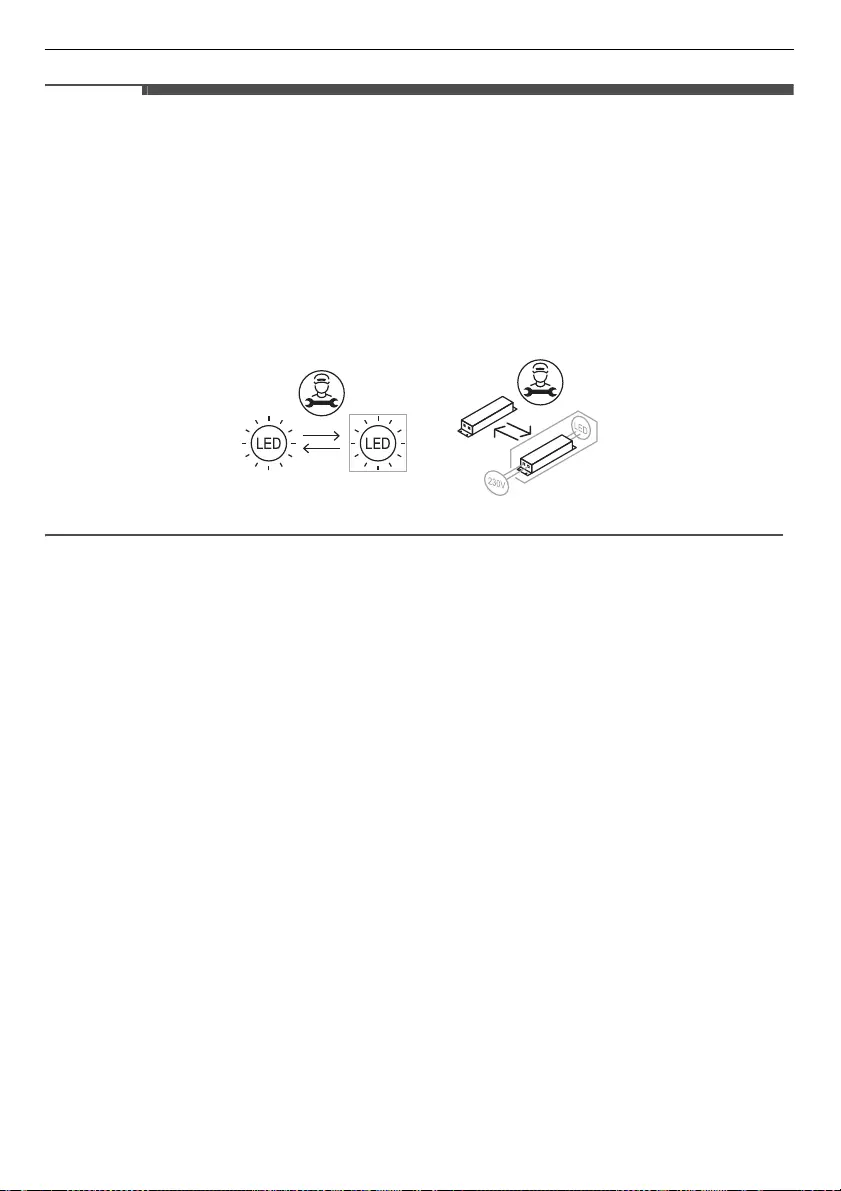
52
TROUBLESHOOTING
NOTE
• Regulation EU 2019/2019, valid from 1st March 2021, is related to the Energy Efficiency classes by
Regulation EU 2019/2016.
• For more information about the energy efficiency of the appliance, visit https://ec.europa.eu and search
using the model name (valid from 1st March 2021).
• Scan the QR code on the energy label supplied with the appliance, which provides a web link to the
information related to the performance of the appliance in the EU EPREL database. Keep the energy
label for reference and all other documents supplied with the appliance (valid from 1st March 2021).
• The model name can be found on the rating label of the appliance.
• This product contains a light source of energy efficiency class G.
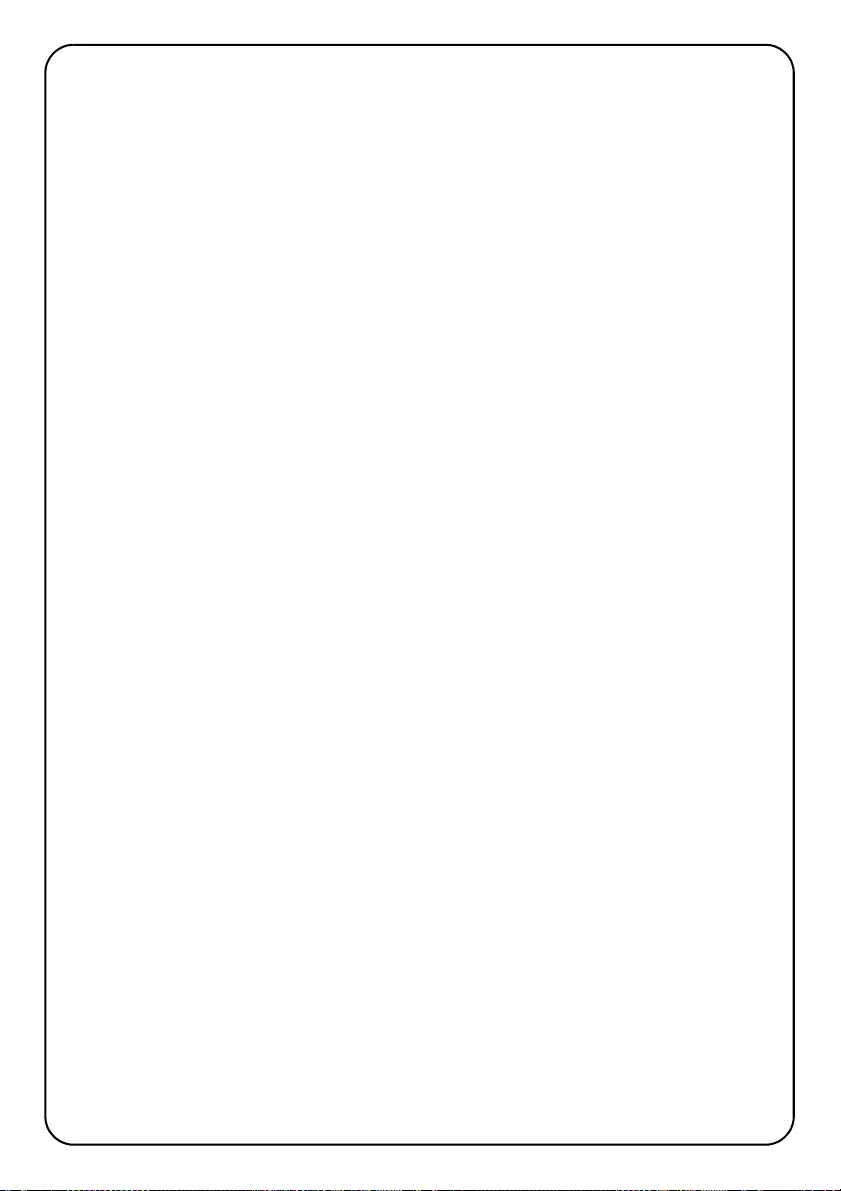
Memo
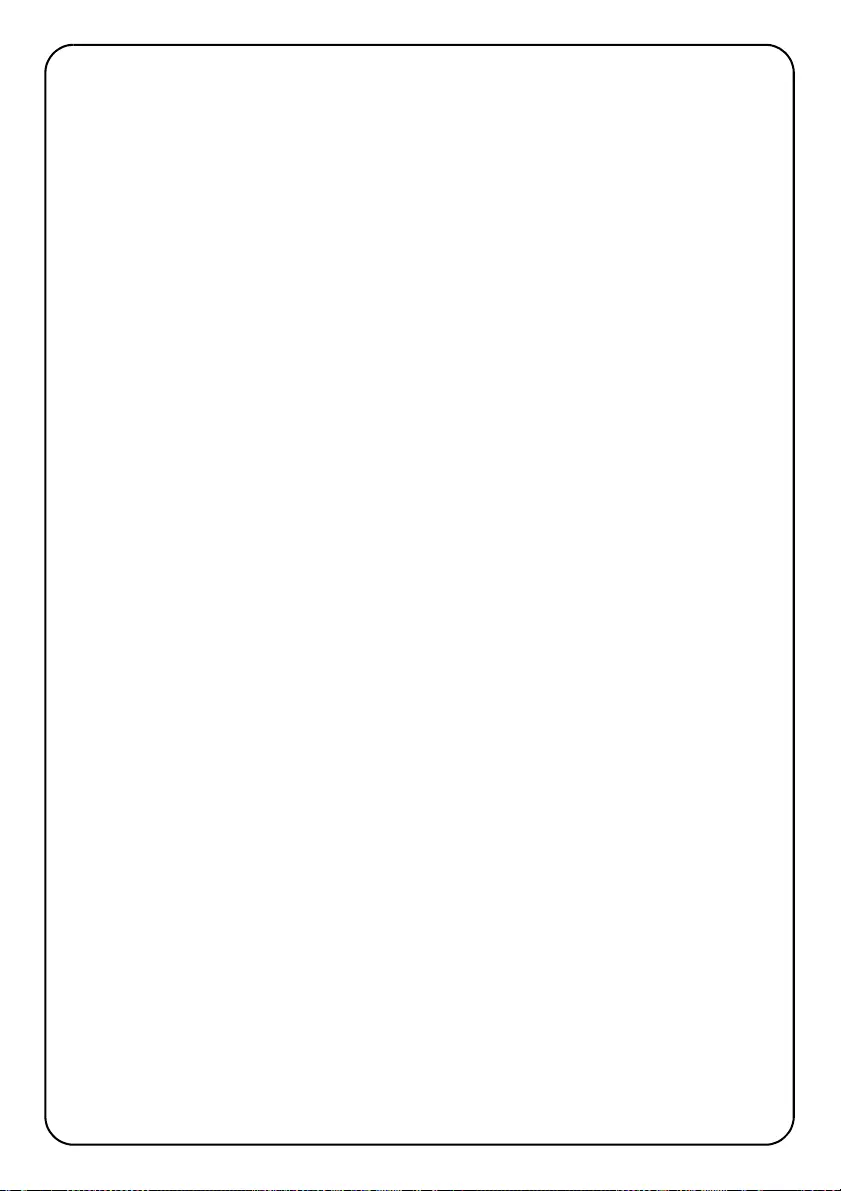
Memo
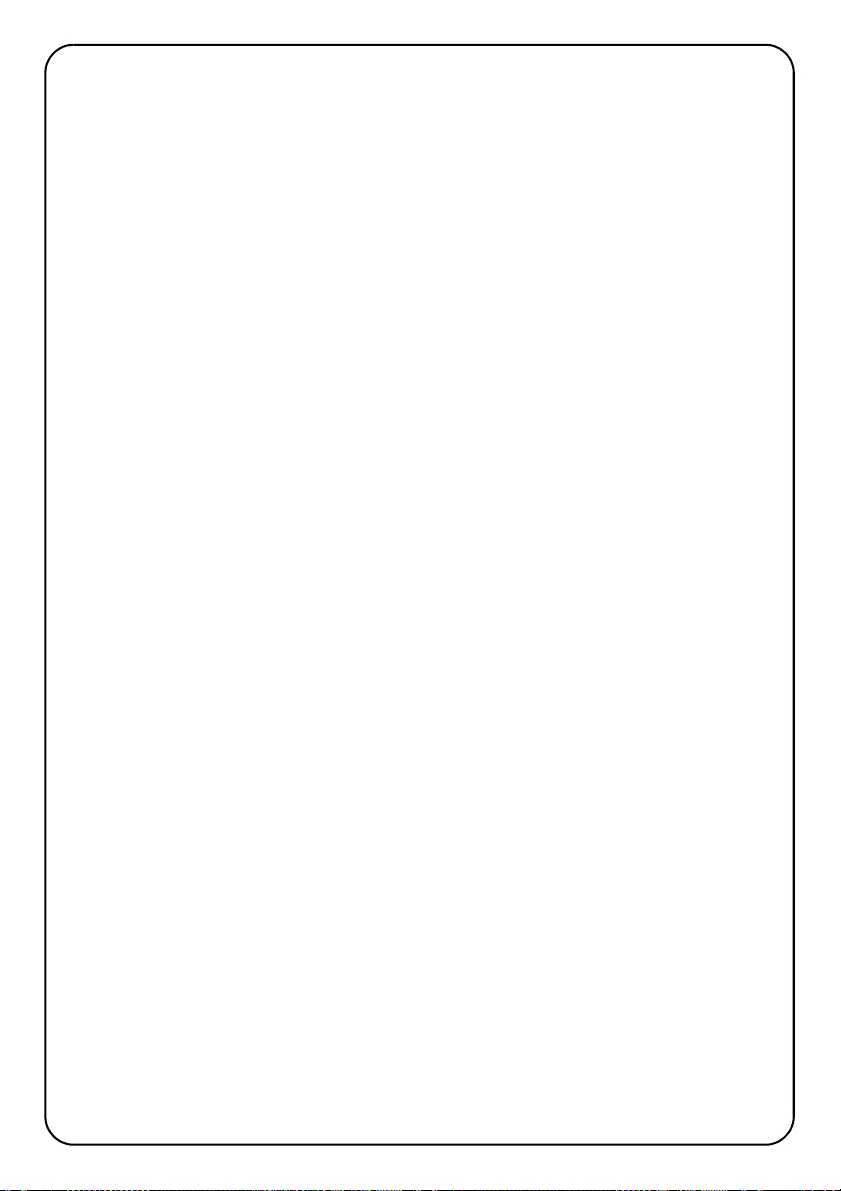
Memo
